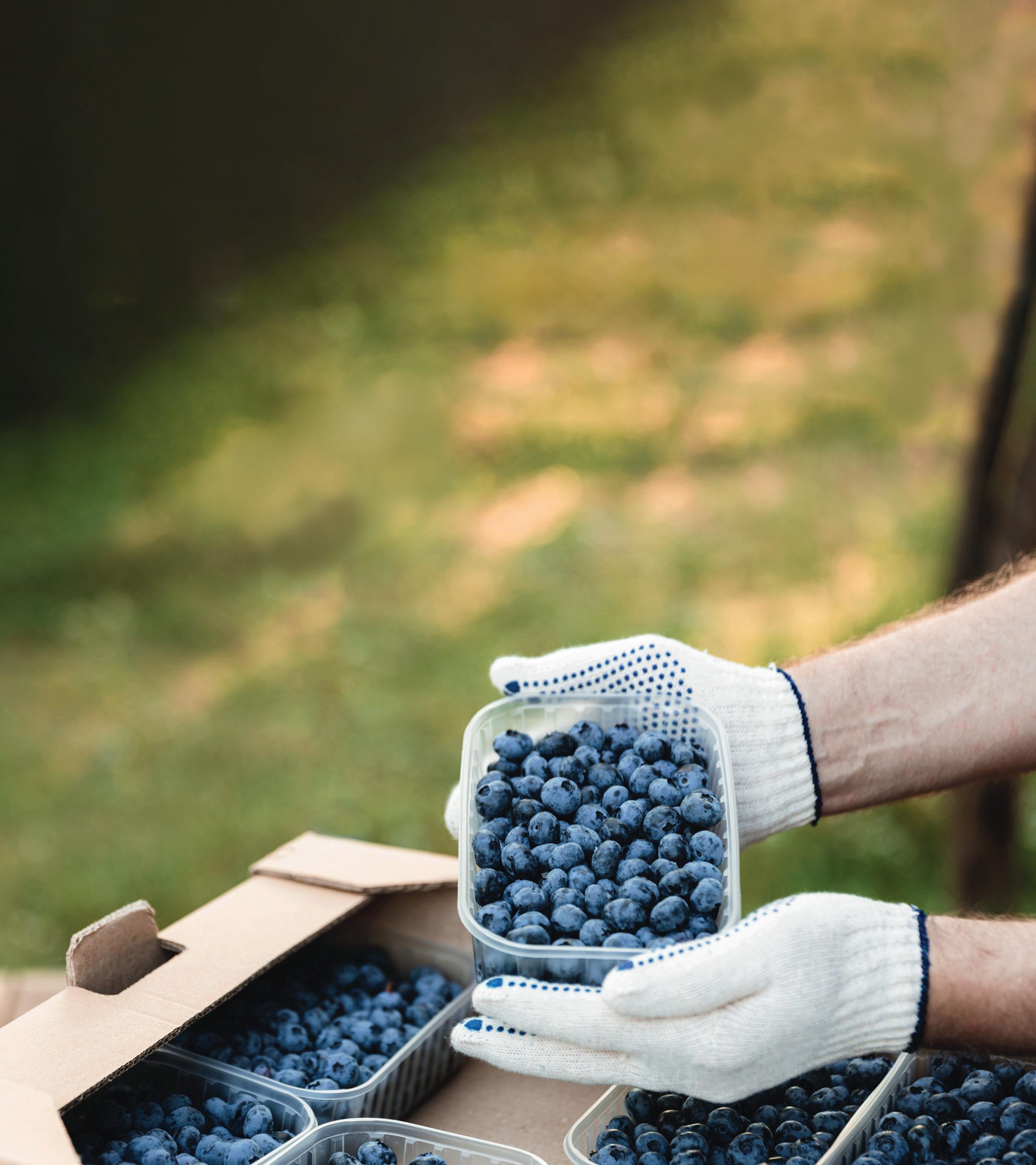


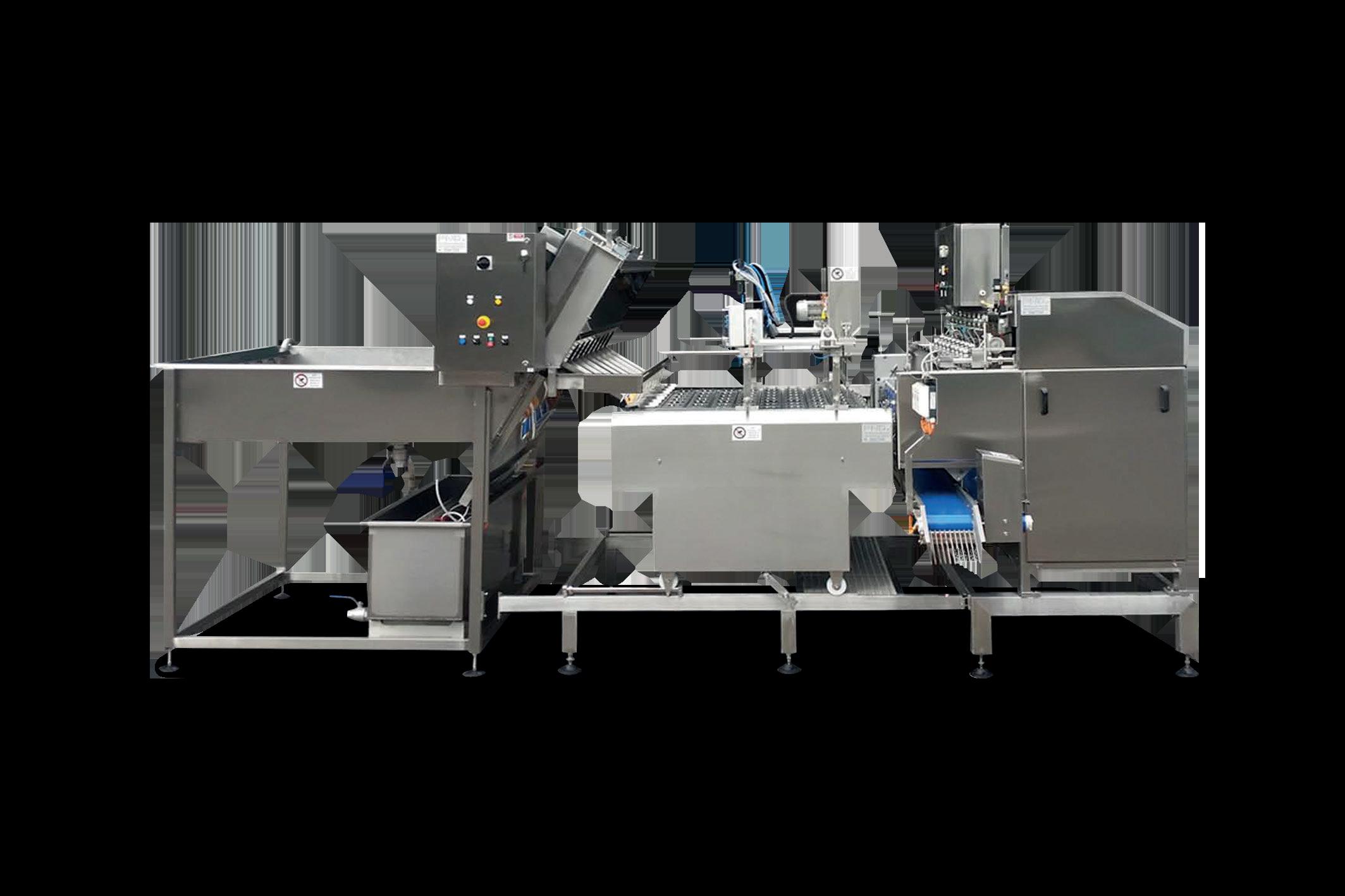
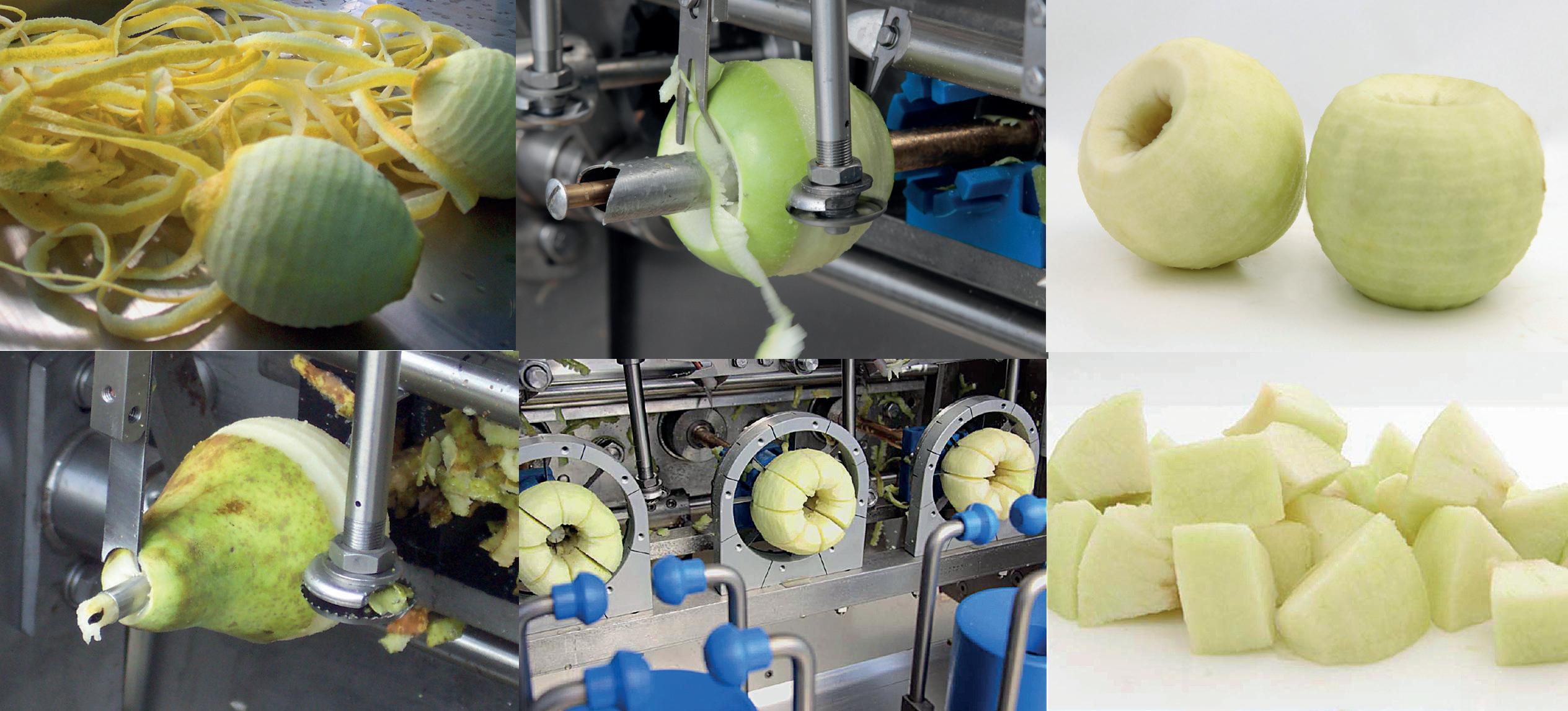



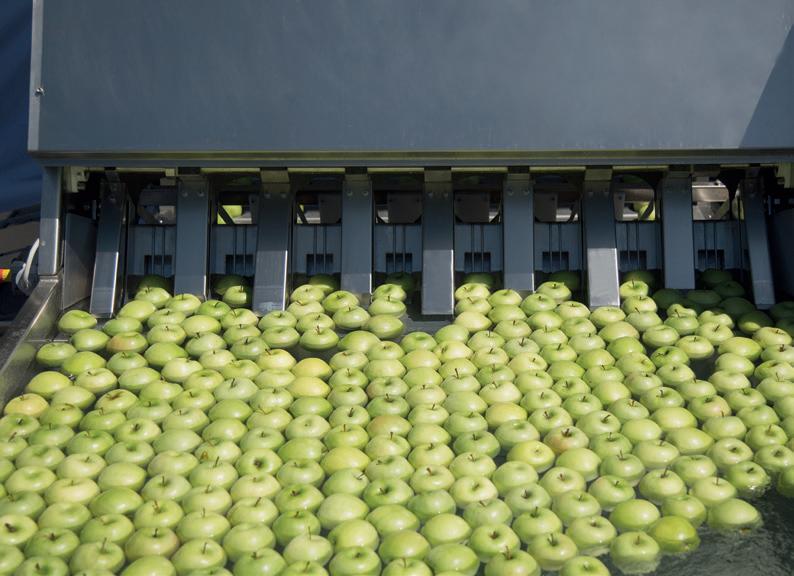












CONSEGNE RAPIDE
La nostra passione per la setacciatura nasce al termine degli anni ’70
Ci caratterizzano da sempre l’intuizione e l’entusiasmo, grazie ai quali siamo riusciti ad affermarci nel mondo della setacciatura.
La nostra struttura è contraddistinta da una forte flessibilità, la quale ci permette di ottenere significativi immediati risultati Il contatto diretto con le problematiche del cliente stimola costantemente la nostra progettualità.
Offriamo una garanzia assoluta di qualità, e garantiamo da sempre il miglior funzionamento del vibrovaglio realizzato ad personam.
Siamo un’azienda 100% Made in Italy; ogni nostro vibrovaglio viene interamente realizzato all’interno della nostra azienda.
I nostri vibrovagli sono in grado di affrontare setacciature molto difficoltose, e portate orarie elevate, grazie agli speciali motovibratori installati, progettati per funzionare in continuo 24 ore su 24 per 365 giorni l’anno.
EMILOS srl
Via della Costituzione, 6
42025 Cavriago (RE) - Italy
Tel. 0522 575010 fax 0522 575145






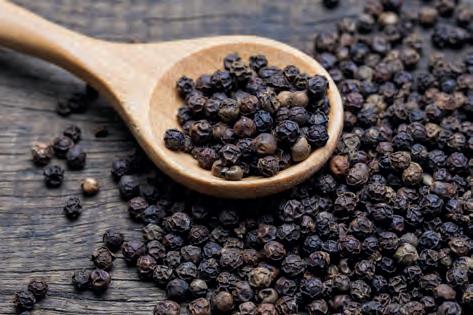












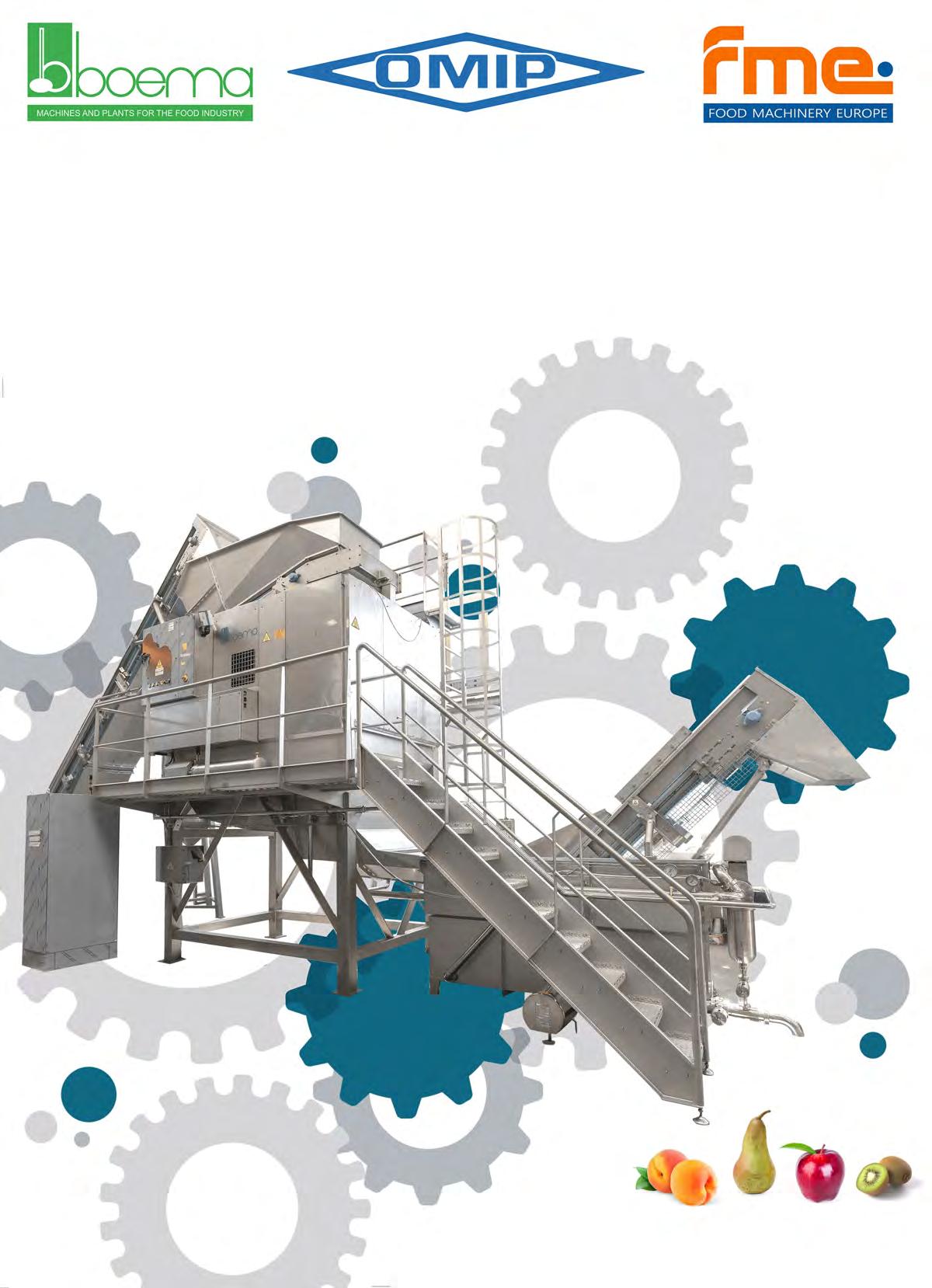

01-50
MACHINERY - PACKAGING LINES - LOGISTICS
51-57
MEAT PROCESSING EQUIPMENT
58-74
PACKAGING
75-87
NEWS
90-104
AUTOMATION
105-112
EXHIBITIONS

SONIA V. MAFFIZZONI Editorial Manager

NAVATTA GROUP FOOD PROCESSING SRL
EQUIPMENT AND LINES FOR THE INTEGRATED PROCESSING OF FRUIT AND VEGETABLES.
PG. 26/28

CHIARAVALLI GROUP SPA
RASSPE BY CHIARAVALLI GROUP: TRADITION MEETS INNOVATION.
PG. 52-53

TECNO PACK SPA
WRAPPING UP QUALITY WITH TAILORED PACKAGING SOLUTIONS.
PG. 62/65
Feeding the planet with technology
On a planet hosting over 8 billion people, and likely even more in the coming years, smart agriculture appears to be one of the most promising paths to tackle global challenges.
While there are no absolute certainties, the adoption of technologies such as sensors, drones, and artificial intelligence seems to offer concrete solutions to enhance agricultural productivity, reduce resource waste, and minimize environmental impact.
Of course, questions remain: what will the overall costs be? What training will be necessary? And what new rules will emerge?
Nonetheless, the prospect of more efficient and sustainable agriculture invites us to look to the future with confidence. We are, in all likelihood, heading in the right direction: a balance between progress and responsibility… the only way to feed a constantly evolving world.

LEADER IN THE PRODUCTION OF VIBRATING SCREENS. PG. 80-81

editorial management and registered office: Editrice Zeus Srl: Via Cesare Cantù, 16 20831 Seregno (MB) - Italy
Tel. +39 0362 244182 / +39 0362 244186 web site: www.editricezeus.com e-mail: redazione@editricezeus.com portal: www.itfoodonline.com skypeTM: editricezeus
Editrice Zeus: +39 379 2421278
Machineries, plants and equipment for food and beverage industry year XXXVI - issue n. 1 - February 2025
editorial manager
S.V. Maffizzoni redazione@editricezeus.com
editorial production Sonia Bennati bennati@editricezeus.com
account dep. manager Elena Costanzo amministrazione@editricezeus.com
project and layout design ZEUS Agency grafica@editricezeus.com
INNOVATIVE AUTOMATIC DOSING SYSTEM: FAST, ACCURATE AND ECO FRIENDLY. PG. 90/92

SERVICE SRL BUILDING A SUSTAINABLE FUTURE TOGETHER AT PROPAK ASIA 2025. PG. 106-107


creative dep ZEUS Agency grafica@editricezeus.com translations ZEUS Agency in partnership with: Thai-Italian Chamber of Commerce info@thaitch.org printing ZEUS Agency
Italian Magazine Food Processing
Europe: single issue: Euro 25
Annual (six issues): Euro 120
Outside Europe: single issue: US$ 30
Annual (six issues): US$ 170
Subscription payment can be made in the name of Editrice Zeus srl, by bank money transfer or cheque.
Italian Magazine Food Processing
An outline of the suppliers of machines, plants, products and equipment for the food industry. Published: monthly. Registration: Court of Monza no.10 of 05.09.2018. Shipment by air mail art.2 comma 20/b law 662/96 Milan. Panorama dei fornitori di macchine, impianti, prodotti e attrezzature per l’industria alimentare Periodicità: mensile. Autorizzazione del Tribunale di Monza, n.10 del 05.09.2018
Spedizione in a. p. 45% art. 2 comma 20/b legge 662/96 Filiale di Milano

by Stefano Pellegatta CEO Fabbri Group
Come and visit us at Fruit Logistica: Hall 1.1, Stand D-51
For 75 years dedicated to responsible and sustainable packaging
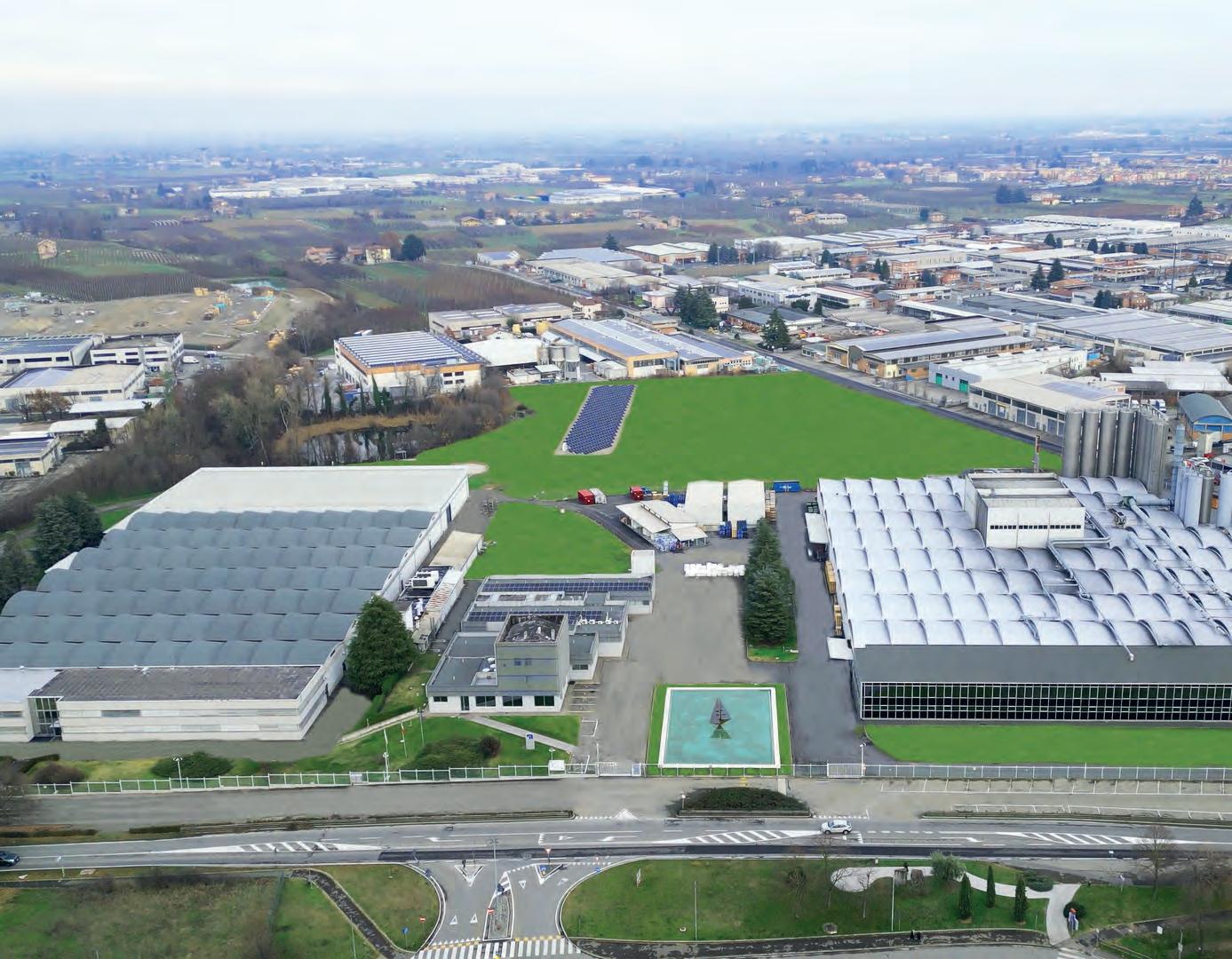
Can you briefly tell us the history of Fabbri Group and how it evolved into a leader in the food packaging industry?
What are the main products and solutions you offer for food packaging, and how do they stand out in the market?
Founded in 1950, Fabbri Group has grown into a global leader in food packaging, offering machines, films, software, services, spare parts – available as stand-alone solutions or combined integrated in a complete system. With +35,000 machines installed globally and thousands of tons of film produced annually, we serve +2,500 companies worldwide. Our solutions range from stretch wrappers and tray-sealers to stretch and lid films, including compostable and bio-based materials, a legacy of innovation that began in the 1950s with fruit preservation packaging.
Our films come in neutral or printed version and different formulations and thicknesses depending on the application. What sets us apart is our “one-stop shop” approach, offering machines, films, services, consulting, and live demos to ensure optimal solutions for our customers.
How does Fabbri Group integrate new technologies and R&D processes to improve the quality and efficiency of your packaging solutions?
We invest over 5% of our annual turnover in R&D and industrial capital expenses, focusing on developing lighter and thinner films with equal or improved performance.
Our efforts are geared towards eco-friendly materials, and energy efficiency, while ensuring compliance with global food safety standards. Some examples in this regard: the certified compostable films Nature Fresh and Nature Lid, the Biobased Star Film, the Fabbri Hybrid machines, and the new mono-material and recyclable PE stretch film currently under development and next to official launch on the international market.
How does Fabbri Group ensure food safety in your machines and packaging materials?
We ensure compliance with applicable legislation in all processes and products. Gruppo Fabbri Vignola is also

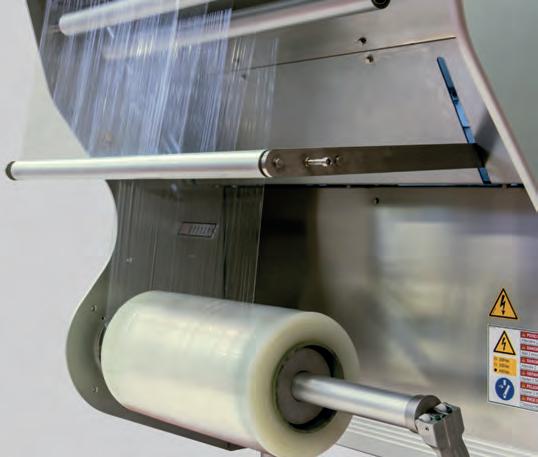
certified ISO 9001 (Quality Management System), ISO 14001 (Environmental Management System), and ISO 45001 (Health and Safety Management System). Our products are designed to maintain food quality and safety, focusing on food preservation and contamination prevention.
What countries do you operate in, and what strategic partnerships have you established globally?
We operate in +90 countries, supported by direct offices in Italy, Switzerland, France, Germany, UK, and more than 100 dealers. We collaborate globally to enhance our reach and better serve our customers.
How important is customization in your solutions, and what after-sales services do you offer to ensure customer satisfaction?
Customization is key. We offer tailored packaging consulting, technical support, and training through our Fabbri Academy and our after-sales services.
What trends or changes do you foresee impacting the future of food packaging, and how is Fabbri Group preparing for these challenges?
Sustainability, automation, and food safety are the key trends shaping the future of packaging.
As mentioned above, we are investing in eco-friendly solutions, digitalization, and technology to ensure our products meet growing consumer demand for sustainability and high safety standards.
Are you planning any investments or expansion projects in the medium to long term?
We are focusing on expanding into emerging markets, particularly in Asia, America, and Africa. We are also enhancing our product portfolio with new technologies to maintain our competitive edge globally.
www.gruppofabbri.com
If the first image the word “greenhouse” evokes is the traditional dome placed over crops, it’s time to reconsider. Today, greenhouses are true technological laboratories where water, fertilizers, light, and soil are meticulously managed to achieve maximum results: healthy, productive, and delicious botanical species.


Gby Sonia V. Maffizzoni
reenhouses have always been valuable allies in agriculture, but with the advent of smart technologies, they are transforming into a cornerstone of the agriculture of the future. In a world increasingly affected by climate change and the need to produce food sustainably for over 8 billion people, high-tech greenhouses emerge as an innovative solution to ensure food security and enhance production efficiency. In other words, they offer a new future for the way we produce food.
Until recently, greenhouses were primarily traditional structures made of glass or plastic, designed to shield crops from weather conditions and extend growing seasons. However, technology has revolutionized these spaces, turning them into highly controlled and automated environments.
Traditional greenhouses, despite their simple foundational structures, have seen significant advancements through the introduction of more efficient heating and
ventilation systems. These improvements allow for the maintenance of optimal climate conditions for crops, while simultaneously reducing energy consumption and enhancing agricultural yields, particularly under unfavorable environmental conditions.
Modern greenhouses come in various types, including hydroponic, aeroponic, vertical, and high-tech greenhouses.
Hydroponic and aeroponic greenhouses stand out for their minimal use of soil and water. Hydroponic systems use a liquid nutrient solution to nourish plant roots, which are suspended in an inert substrate like perlite or coconut fiber, without the use of soil.
Aeroponics, on the other hand, involves suspending roots in the air and misting them with a fine spray of nutrients. Both methods offer numerous advantages, including space optimization, water savings, and precise control over growth conditions, making them ideal for urban settings or agriculture in resource-limited areas.
While these systems require higher initial investments, they are perfect for sustainable production of vegetables and plants in controlled environments. By eliminating soil and directly applying nutrient solutions to roots, aeroponic and hydroponic systems save up to 90% more water than conventional agriculture.
Vertical greenhouses utilize vertical space to optimize land use, enabling plant growth in urban areas or spaces with limited availability. These systems employ towers or walls where plants can grow, allowing for a higher yield of vegetation in a smaller footprint. Vertical greenhouses can also adopt hydroponic or aeroponic methods, with multi-level modular structures for plant cultivation. Automated irrigation and nutrient distribution systems, along with artificial lighting to optimize photosynthesis, are often integrated. In many cases, renewable energy sources such as solar power are used to make these operations more sustainable.
Vertical greenhouses provide benefits such as reduced water usage, high productivity per square meter, and the ability to grow plants in urban environments, minimizing transportation needs and reducing the ecological footprint. They are particularly suited for growing vegetables, herbs, and leafy plants but can be adapted for larger crops depending on the system.
Finally, high-tech greenhouses represent an extraordinary evolution in the agricultural sector. By integrating sensors, robotics, and artificial intelligence systems, these greenhouses enable constant monitoring of key parameters like temperature, humidity, and nutrient levels, thereby boosting crop yields. This technology allows for the optimization of every aspect of cultivation and real-time responses to plant needs, ensuring extremely efficient resource management.


Smart greenhouses offer countless advantages, all aimed at improving efficiency and sustainability.
Thanks to controlled environments, crops can thrive under optimal conditions year-round. This not only enhances crop quality but also increases yields, making agricultural production more efficient. The ability to adjust temperature, humidity, and lighting reduces periods of plant dormancy, resulting in more abundant and frequent harvests.
Another significant benefit is the reduction of environmental impact. Targeted irrigation systems, such as drip irrigation or hydroponic methods, can cut water consumption by up to 50%, optimizing the use of this precious resource and minimizing waste.
Furthermore, installing greenhouses near urban centers reduces CO2 emissions associated with transporting agricultural products, thereby promoting sustainability. This “zero-kilometer” production model not only shortens supply chains but also supports local economies by encouraging the consumption of fresh, local products.
Advanced greenhouses also provide a concrete response to climate change, protecting crops from extreme weather events like droughts, sudden frosts, or torrential rains. The protection offered by greenhouses ensures
stable agricultural production even during periods of climatic uncertainty, minimizing risks associated with adverse weather conditions.
Finally, resource optimization cannot be overlooked. Precision fertilization, which delivers nutrients only when and where needed, significantly reduces the use of chemical fertilizers, conserving resources and minimizing environmental impact. This approach achieves highquality yields while keeping operational costs low and improving overall process efficiency.
Greenhouses are no longer just structures for protected cultivation but are instead laboratories of innovation and sustainability. As the global population grows and challenges linked to climate change intensify, their role becomes increasingly pivotal.
Investing in smart greenhouses not only enhances production efficiency but also ensures a more sustainable future for global agriculture. In the Netherlands, for example, the adoption of technologically advanced greenhouses has enabled water consumption to drop by up to 90% while maintaining high production levels of top-quality vegetables. This model, adaptable to specific local needs, demonstrates how technology can seamlessly integrate with tradition.

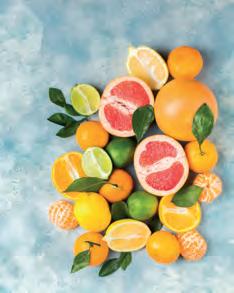






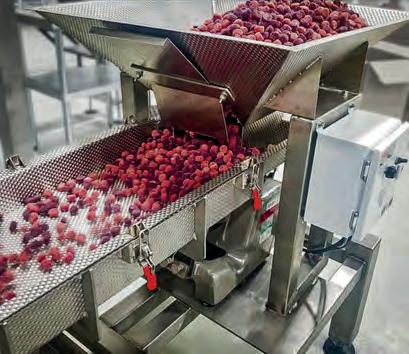


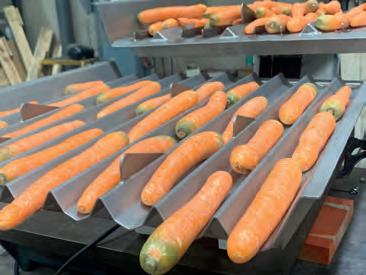




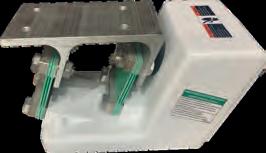

In the fruit and vegetable industry, efficiency and precision in product handling are essential to ensure quality and freshness. One of the most effective tools for achieving this are electromagnetic feeders. These systems play a crucial role in automating processes, improving productivity, and reducing waste.
Tarnos electromagnetic feeders uses controlled vibrations to move and dose products. They operate through an electromagnetic system that generates vibrations, allowing

products to travel along an inclined surface. This movement facilitates the uniform feeding of fruits and vegetables to processing, packaging, or sorting lines.
in the Fruit and Vegetable Industry
1. Precision in Dosing: These feeders allow for precise control
over the amount of product being transported, which is essential to avoid waste and ensure production specifications are met.
2. Damage Reduction: By using gentle vibrations, damage to delicate fruits and vegetables is minimized, helping to maintain the quality of the final product.


3. Flexibility : Feeders can be easily adjusted to handle different types of products, from small fruits like strawberries to larger vegetables like pumpkins.
4. Ease of Cleaning: The trays are designed in stainless steel are not only easy to clean, they also avoid product remains and traces along the surfaces in contact with the material manipulated, making them suitable for the strict hygiene regulations of the food industry.
5. Increased Productivity: By automating the feeding process, the need for manual in-
tervention is reduced, allowing workers to focus on other tasks and increasing overall operational efficiency
Electromagnetic vibrator feeders are used in various stages of processing fruits and vegetables, including:
- Sorting: They help classify products by size and quality before packaging.
- Packaging: They facilitate the transport of products to packaging machines, ensuring a constant flow.
- Transport: They are used to move products between different
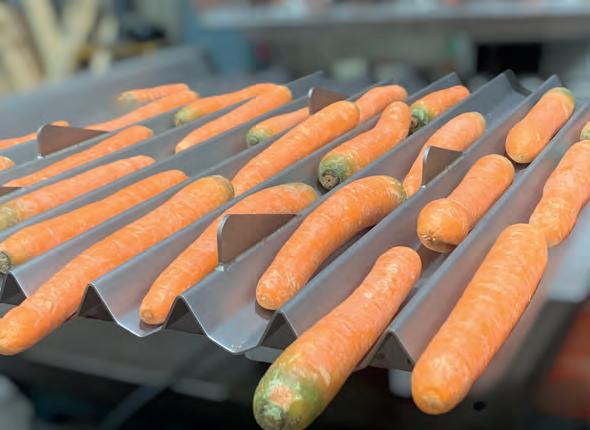
stages of the production process, ensuring freshness is maintained.
Electromagnetic vibrator y feeders are an innovative and efficient solution for the fruit and vegetable industry.
Their ability to improve precision, reduce damage, and increase productivity makes them an indispensable tool in modern food processing.
As the industry continues to evolve, we are likely to see an increase in the adoption of these technologies, benefiting both producers and consumers.
Tarnos has designed and manufactured vibrating material handling equipment for more than 60 years with the support and knowhow of a strong pioneer in this field, Syntron.
The participation in many projects and applications through all these years, and even in different industries, provide the company with experience to solve problems in many critical handling processes.
www.tarnos.com

OMIP SRL, founded in 1971, is targeted at all the canning companies which need to have a more reliable equipment, built with quality materials and great robustness, where the cost of production, as well as that of the workforce, is minimized.
For this reason, it is focused on the design and construction of machinery characterized by simplicity of operation, versatility and reduction of costs.
“Thanks to research, development and innovation, we have been able to introduce, on the world market, the most modern technologies in the field of pitting and hence becoming a global reference for fruit processing” said the company managers Francesco Pannullo and Alfonso Califano.
“In addition to continuously improving the products already on the market, our objective of expanding our manufacturing horizons through the design of machinery capable of transforming fruits and vegetables other than those that it is already able to process – added sales manager Timothy Ahiagba - Examples of such achievement include the apricot pitters mod. KA3 and KA6, the peach Repitter and the Avocado Pitter mod. KAV2.”
Avocado Pitter mod. KAV2
“The KAV2 pre-cuts the Avocado separating it into two halves and thereby facilitating its pitting – continued the
managers - The machine, available on the market over 8 years, is suitable to pit the avocado fruit even if it is not perfectly graded.”
All parts having contact with the fruit are for alimentary and hygienic purposes and the structure is completely made of stainless steel.
The avocados, appropriately unloaded into the Feeder, are discharged into the channels of the Orientation station that orientates the fruits and positions them at the ideal cut through suitable and particular devices.
The flexibility of the orientation elements allow the machine to automatically compensate for the differences in the fruits that are not perfectly graded.
The Cutting Station is made up of three particular circular blades. “The innovated mechanisms have, almost all, eliminated the machine lubrication and have hence reduced operation costs to their minimum.”



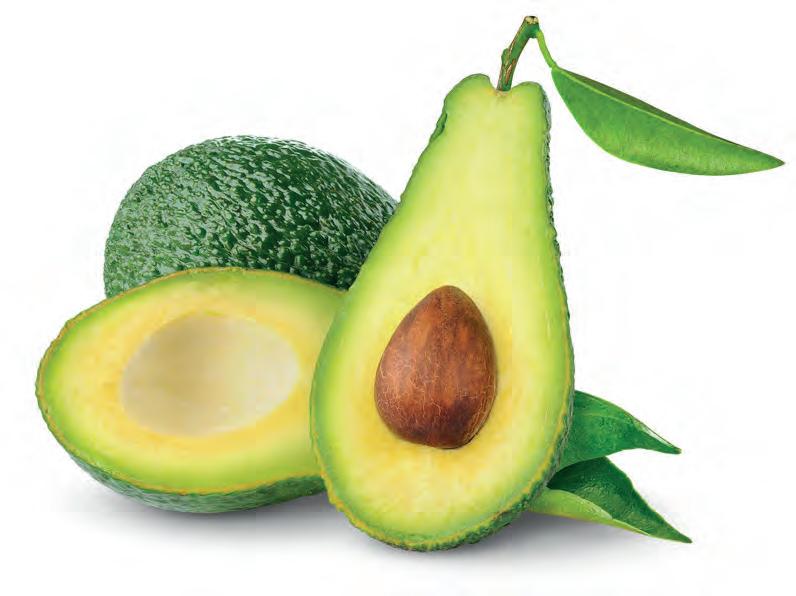



OMIP’s organizational skills and the quality of their products have enabled them to establish themselves on all markets: from the Italian to European, from the South American and Californian ones to those of South Africa and Australia up to the Asian and New Zealand markets.
Today, the use of the latest mechatronic applications, places OMIP a step ahead, hence revolutionizing once again, the sector of fruit pitting.
OMIP are exhibiting at the forthcoming Fruit Logistica 2022 (Berlin, 5-7 April) in Hall 3.1, Stand A-06. For more information on company solutions, company managers Francesco Pannullo and Alfonso Califano will be there together with the sales manager Timothy Ahiagba.
www.omip.net

In an overcrowded world, even small savings (in water, soil, and resources) can make a big difference. That’s why smart agriculture is gaining ground. Is it a deal reserved only for the big players in the market?
Not at all-there’s room for everyone: one step at a time, building a new culture day by day that can harness the wonders of new technologies. “ “
Agriculture is a sector in constant transformation and is now at the heart of an epochal change. The adoption of innovative technologies is revolutionizing the way we cultivate, manage resources, and address global challenges like climate change, population growth, and the need for greater sustainability. Smart agriculture, or precision farming, is not just a trend but a tangible solution to improve productivity and efficiency while reducing environmental impact. Its beating heart is technology-cutting-edge solutions in continuous evolution that allow farmers to make informed decisions based on real data.
Emerging technologies
At the forefront are agricultural drones, capable of monitoring crops from above and promptly detecting water stress, diseases, and infestations.

by Elisa Crotti

These tools enable targeted interventions, reducing waste and improving yields. Detection strategies are particularly fascinating. For example, spectral and multispectral sensors detect light reflected by plants in various bands of the electromagnetic spectrum, including wavelengths invisible to the human eye (such as infrared and ultraviolet).
Data analysis reveals that plants under water stress reflect less light in the near-infrared spectrum and more in the visible spectrum. Indices like NDVI (Normalized Difference Vegetation Index) help identify areas of reduced growth or stress.
Additionally, specific changes in leaf color or reflectance can indicate pathogens, nutrient deficiencies, or pest attacks.
A comprehensive health analysis of the plant can also be augmented by thermal sensors, which measure the surface temperature of plants. Plants under water stress close their stomata to reduce water loss, causing leaf temperature to rise. Thermal drones detect these thermal anomalies and flag them immediately-nothing is left to chance.
Equally essential are IoT sensors, devices that measure parameters such as soil moisture, temperature, and quality. Connected to digital platforms, they offer a constant, detailed overview of soil conditions. Artificial intelligence and big data complete the picture by analyzing large amounts of information to provide forecasts and optimize agricultural operations, from crop planning to resource management.
Robotics is also transforming traditional activities like sowing, harvesting, and weeding, introducing autonomous machines that lower labor costs and increase precision. A sector driven by technology but still governed by human expertise.
The many resources deployed to reduce waste inevitably play a key role in the race for sustainability. Precision technologies allow for a significant reduction in the use of resources such as water and fertilizers. Precision irrigation, for example, uses sensor data to ensure water is applied only where and when needed, avoiding waste and preserving water reserves. A study on various irrigation systems highlighted water savings of between 12% and 30%, with an average of 19% over six years. Similarly, targeted fertilization allows nutrients to be applied locally, improving soil health and minimizing environmental impact.
One study found a 14% increase in wheat production through precision fertilization, significantly reducing the risk of groundwater contamination (research conducted by CREA-Italy’s Council for Agricultural Research and Economics).
Moreover, innovations in food waste management benefit from advanced preservation and logistics systems, reducing spoilage along the supply chain and ensuring a greater percentage of harvests reach the final consumer.


Numerous examples worldwide demonstrate the potential of smart agriculture.
Innovative startups are developing advanced solutions for crop monitoring and data management, making these technologies accessible to smallscale farmers. Case studies highlight how adopting smart technologies can significantly increase productivity and reduce operational costs. In many regions, pioneering projects are redefining agricultural standards, showcasing how a combination of innovation and tradition can address sector challenges.
Despite its many advantages, adopting smart agriculture is not without its challenges. The initial costs of these technologies can pose a significant barrier, especially for small-scale farmers. Moreover, using advanced systems requires new skills, making training programs and technical support essential. Regulations also play a critical role: the responsible management of data collected by smart technologies must be ensured through appropriate policies that protect farmers and consumers.
Smart agriculture is a tangible response to the needs of an ever-changing world.
By integrating tradition and innovation, it is possible not only to increase productivity and reduce environmental impact but also to create a more resilient and sustainable agricultural model. The future of farming lies in the hands of technology and a new collective awareness: cultivating the planet means cultivating our tomorrow.

Let’s build the warehouse of tomorrow.
Efficient warehouse operations are critical in today’s fastpaced, demand-driven market. From warehouse automation and material handling to intralogistics, Didak Injection delivers solutions that drive efficiency, reduce costs, and enhance accuracy. Ready to transform your operations within fruit and vegetables?
Benefits of modernizing your Warehouse
1. Enhanced Efficiency
Automation and smart intralogistics solutions reduce time spent on repetitive tasks, enabling faster order fulfillment and fewer bottlenecks.
2. Cost Savings
While the initial investment may seem

high, automation reduces labor costs, minimizes errors, and extends equipment lifespan through predictive maintenance.
3. Improved Accuracy
With automated systems like barcode scanners, RFID, and robotic picking, accuracy rates in inventory and order fulfillment can reach near perfection.
4. Scalability
Modern warehouse systems are flexible and can grow with your business
needs, ensuring you’re prepared for increased demand or new product lines.
5. Safety Enhancements
Automation minimizes human interaction with heavy machinery, reducing workplace injuries and improving overall safety compliance.
6. Sustainability
Efficient systems often use less energy, optimize space, and reduce waste, contributing to a greener supply chain.
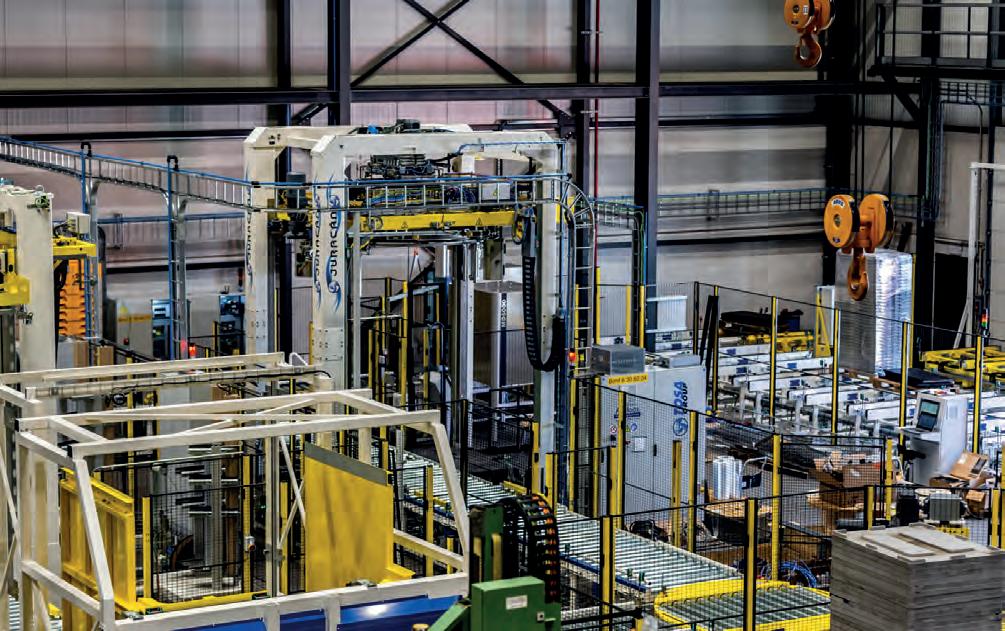



As supply chain demands evolve, the need for efficient, flexible, and sustainable warehouses will only grow. Whether you’re looking to automate, optimize, or completely transform your warehouse operations, Didak Injection is here to help.
• Expertise: Decades of experience in manufacturing and logistics.
• Innovation: Partnerships with the best technology providers.
• Customization: Solutions tailored to your unique needs.
• Sustainability: Commitment to greener, more efficient practices.

Euro standard crates for the fruit and vegetables
Our reusable plastic containers are specially designed for the transport and storage of fruit and vegetables. They comply with Euro standards for maximum pallet and truck compatibility and offer maximum hygiene, optimum cleanability, space-saving transport and storage solutions and perfect traceability (RFID & barcode).
Our top product for the fruit & vegetables industry. The Foldaway crate is engineered to meet the highest standards of strength and safety. With an incredibly low stacking height of just 30mm, it’s designed to be interstackable for easy storage. Moreover it’s one of the lightest folding crates on the market, offering the best weightto-internal volume ratio. Perfect for efficient handling and space-saving solutions, without compromising on strength or performance.

The PPWR is a crucial step towards a more sustainable and circular economy in the EU. The regulation will set targets for waste reduction, recycling, and sustainable material use.
It brings opportunities for innovation and growth for the packaging material industry and its customers.
We can help and service you with our expertise on this topic.
Would you like more information?
Do you have questions about building your warehouse of tomorrow?
Do you want to inspect our standard crates or our top product Foldaway?
Are you in need of custom-made crates?
Or do you want more insights about the PPWR? We are here to answer all your questions.
Feel free to contact us at info@didak.eu or visit our booth (C-40, Hall 27) at Fruit Logistica.
www.didak.eu

The company Navatta, founded by Mr. Giuseppe Navatta in 1983, produces and installs fruit and vegetable processing lines and boasts references across the globe.
NAVATTA, THE GLOBAL SUPPLIER OF INTEGRATED FRUIT & VEGETA-
BLES PROCESSING EQUIPMENT AND LINES, PROVIDING WELL PROVEN AND INNOVATIVE SOLUTIONS FOR A FULL RANGE OF PLANTS also thanks to the numerous companies’ acquisitions over the years, such as Dall’ Argine e Ghiretti in 2001, a 40–year-old company world famous for rotary can pas-
Line to produce thermostable jams for bakery products. Working capacity: up to 2.400 kg/h product ready for hot filling.
teurizers and tomato pulping lines; Mova, in 2010, with extensive experience in bins handling, bins and drums emptying, palletizers and depalletizers, washing systems; Metro International, in 2012, leader in fruit and vegetables processing, boasting international patents for juice and puree extraction, concentration plants

Bag-in-drums 220 l frozen fruit puree processing line: emptying, heat treatment, aseptic filling 3 - 5 kg.

and thermal treatment; Ghizzoni Ettore, in 2012, specialized in special batch plants for ketchup, sauces and jams.
NAVATTA GROUP manufactures and commissions Processing Lines, Systems, Equipment for Fruit, Tomato, Vegetables for:
• Peeled / diced / crushed tomatoes, tomato sauces and purees, tomato paste, all filled into any kind of package or in aseptic;
• Diced, puree, juices (single strength or concentrated) from Mediterrane-

an / tropical fruit, all filled into any kind of package or in aseptic;
•Fruit crushing lines from IQF, frozen blocks and frozen drums
• High yield PATENTED fruit puree cold extraction, fruit purees / juices equalized in aseptic.
•Wide range of evaporators to produce tomato paste Mediterranean
and tropical fruit concentrate.
•Aseptic sterilizers
• Aseptic fillers for spout bags/ spout-less Bag-in-Box 3 – 20 liters, Bag-in-Drum 220 liters, Bin-in-Box / IBCs 1.000 – 1.500 liters;
•Piston Fillers
• “All-in-one” pasteurizer / cooler spirals

Single head aseptic filler “Webzero” for web small bags 3-5-10-20 liters - automatic loading system - no operator needed – patented system. Semi-automatic filling of 220 bags in drum. Aseptic tank and sterilizer.
• Formulated products productions (jam, ketchup, sauces, drinks) starting from components unloading to dosing, mixing, mechanical / thermal stabilizing, to filling into any kind of package or into aseptic;
•Processing pilot plants;
• Vegetable processing as receiving, rehydration, cooking, grilling
Navatta Group’s headquarter and the two production units are located in Pilastro di Langhirano, Parma, with a total production area of 10,000 square meters. A new area of 10,000 square meters has recent-
ly been purchased and is ready for the third processing unit to be built.
Vision: passion is the factor that drives us to higher targets, in terms of technology, products and services.
Mission: to constantly increase Customers’ satisfaction and fidelity.
Visit: www.navattagroup.com
Navatta, the global supplier of integrated fruit&vegetables processing equipment and lines, providing well proven and innovative solutions for a full range of plants.
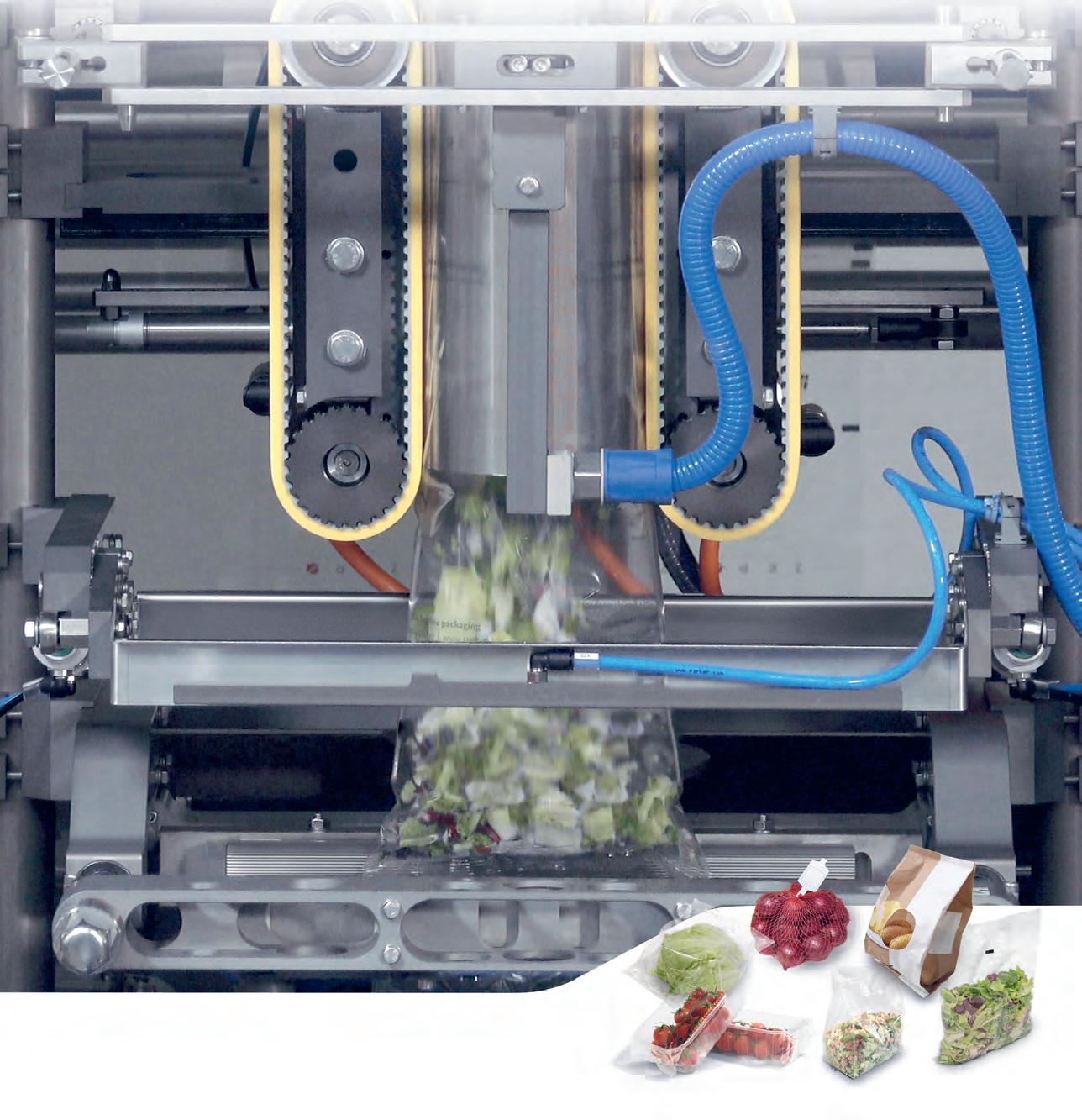
IMA FLX HUB, AT THE CENTRE OF YOUR NEXT COMPLETE FLEXIBLE PACKAGING LINE.
Weighing, counting, VFFS vertical bagging, HFFS flow wrapping, net clipping and end-of-line packaging solutions combine with each other to form tailored turnkey lines for the Produce industry.
On show, an IMA Ilapak Vegatronic 6400 ML bagger for cut salad coupled with a WA PRO 16-50 multi-head weigher, and the IP 3000 case packer for the fresh produce.
FRUIT LOGISTICA 2025
BERLIN, GERMANY - 5-7 FEBRUARY 2025
Hall 1.1 | C-10
ima.it/it/flexible-packaging-hub
ima.it
In recent years there has been a strong growth in the market of gallon water bottles, both in Italy and worldwide.
Dispensers showed a positive trend, apart from the temporary setback caused by the Covid-19, mainly involving offices, factories, warehouses and various communities.
The success of gallon bottles, in particular those of reusable PET or PC bottles, obviously involves the need to guarantee the safety of water, and consequently the cleaning of containers and dispensers. Which must be accurately and periodically sanitized. The water used to fill the gallon bottles, which can be natural spring water or water from other sources, must comply
with the quality parameters defined in Community legislation on water intended for human consumption.
Used empty gallon bottles, if still intact, can be reused. But before being inserted in a new filling cycle, they must be inspected for integrity, absence of discoloration and possible odours.
After that, they must be washed with water and specific detergents and rinsed thoroughly with special machines. Like those built by Akomag, for example, an Italian company specialized in the design and production of machines and plants for the bottling industry.
Washing, rinsing, filling, cap-
ping The Monobloc washer for gallon bottles Sira has been designed by
Akomag for washing and sterilizing PET or PC gallon bottles or other bottles of various sizes, to be filled with still water.
The washing cycle adapts to the various production needs of the end customer and is very effective. For this machine Akomag has designed and produced a special spraying and brushing device for gallon bottles that ensures total cleanliness.
Through the use of special mobile nozzles furniture (penetrating and rotating), the machine washes the bottle internally at high pressure (5 bar). While the outside is brushed by means of nylon brushes.
The machine can be quickly adapted to the different bottle formats by sim-


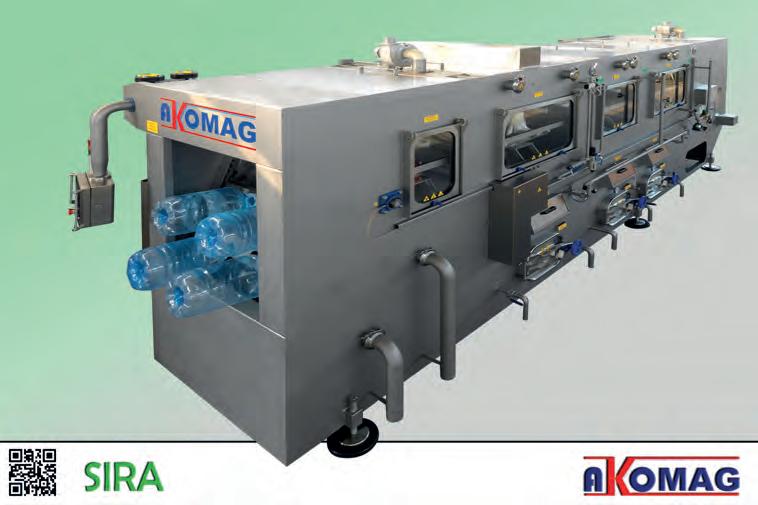
ply setting the type of container to be handled on the control keyboard.
The stainless steel control board installed next to the monobloc is easily accessible for the operator. The panel is equipped with a touchscreen for the complete manage-
ment of all line functions, and the display of operating parameters and alarms.
The Monobloc features an automatic de-capper in stainless steel: a pneumatic system grips the bottle neck while ejecting the cap. The system is
safe, but it can be equipped with a system for the selection and ejection of gallon bottles that have not been properly de-capped.
The bottles are then filled by means of special inverter- controlled pumps.
A valve designed by Akomag guarantees a laminar flow and no contact between the valve and the bottle.
The filling is carried out by means of a special metering device that ensures extreme filling accuracy.
The capper consists of soundproof vibrating hopper, a descent channel, and a tear-off pick-up head.
The closure of the bottle is guaranteed by an inclined pressure belt characterized with adjustable pressure.
All adjustments are automatic and managed from the control panel
www.akomag.com
The packaging of fruits, vegetables, and ready-to-eat fresh produce (fourth range) is undergoing an unprecedented revolution, driven by the need to balance environmental sustainability, product protection, and consumer convenience.

by the editorial staff
In a market increasingly focused on reducing environmental impact, producers and distributors are investing in innovative solutions that enhance customer experience without compromising freshness and quality.
One of the most exciting developments is the adoption of compostable and biodegradable materials. Packaging made from plant fibers, cornstarch, or bioplastics offers a tangible alternative to traditional materials. These options not only reduce environmental impact but also convey a positive message to

consumers who are increasingly sensitive to eco-friendly choices. However, maintaining the same performance in terms of preservation and protection is crucial to the success of these solutions.
Technology is playing a key role in this transition. Smart packaging, equipped with integrated sensors, is becoming a reality in the fruit and vegetable sector.
These sensors can monitor parameters such as temperature, humidity, and gas levels within the packaging, providing valuable information to distributors and consumers. This makes it possible to detect potential issues before the product deteriorates, reducing waste and improving customer satisfaction.
Packaging design is also evolving to meet the needs of modern consumers. Reclosable, easy-to-carry, and durable packaging is becoming standard for fourth-range products. Additionally, design plays a fundamental role in attracting customers and communicating product quality. The use of transparent materials and appealing graphics
can make a significant difference in purchasing decisions, especially in such a competitive market.
Another crucial aspect is sustainability in logistics. Lightweight and durable packaging helps reduce transportation costs and environmental impact while improving supply chain efficiency.
Furthermore, many companies are experimenting with modular packaging systems that optimize space utilization during transport, reducing CO2 emissions.
The challenge for the sector is balancing innovation with costs. While many advanced technologies require significant initial investments, the long-term benefits in terms of waste reduction, quality improvement, and customer loyalty make these solutions highly advantageous. In an era when consumers demand healthy and sustainable products, fruit and vegetable packaging represents not only an opportunity for differentiation but also a responsibility toward the environment and future generations.

The PND mango peeler positions itself in international markets as a paragon of Italian engineering ingenuity. This machine, the best-selling of its kind, stands out as the ideal solution for the food industry, thanks to its ability to adapt to fresh, frozen, and dehydrated sectors.
A range for every need
From the compact PL4M model with 4 heads, capable of processing 700 kg/h, to its larger counterpart with 8 heads nearing 112 fruits per minute, PND has considered everything. Each machine in the line is a powerhouse of strength and precision, designed to optimize produc-


tion processes without compromising the quality of the finished product. These machines are the key to an industry aiming for peak efficiency while maintaining high processing standards.
The PND mango peeler is distinguished by its ability to handle fruits of any ripeness level, ensuring a near-perfect yield post-peeling. This not only ensures resource optimization but also places the company at the forefront of promoting sustainable practices, minimizing food waste.
The ease of maintenance and cleaning, thanks to the use of stainless steel and intuitive design, translates into reduced machine downtime and greater longevity of the machinery, essential aspects in a modern production context.
The secret to PND’s success lies in the versatility of its peelers, which have conquered markets around the world, from South America, rich in mango plantations, to Europe, where the demand for technologically advanced solutions is constantly rising. This spread testifies to the universality of the solution proposed by PND,

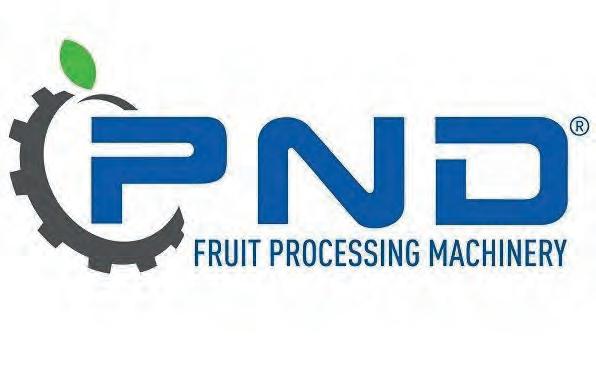
capable of adapting to different contexts and production needs.
PND does not limit itself to provid-

ing cutting-edge machinery; it also offers top-level post-sale assistance, with remote support to ensure operational continuity and efficiency for its clients. This customer-focused approach confirms the company’s philosophy: to innovate not only in products but also in service.
The story of the PND mango peeler is a shining example of how the company is capable of creating solutions that significantly improve the modus operandi and efficiency of hundreds of companies in the fruit processing world. With a constant focus on sustainability and efficiency, PND reaffirms itself as a benchmark in the sector
Visit: pndsrl.it
NICOFRUIT is a registered trademark, owned and distributed by Frutthera Growers, an Italian company located in the Basilicata region, in the south of the Country.
This area is well known and is ideally suited to the growing of strawberries, grapes, kiwi and citrus. These fruits find their natural habitat here and are included in the most representative made-in-Italy productions
Adopting the integrated production quality system means employing environmentally friendly production methods, protecting the health of both workers and consumers, making use of technical and economic features of the most modern production systems.
Special care to the environmental issues led the company to achieve an important result: the drastic reduction of pesticides, implementing specific natural technics and recurring to a massive use of antagonistic insects.
Natural protection of the plants gave a large contribution to get a “zero residues” pesticides for a lot of the fruit we produce.
Packaging represents another way to respect Earth. A totally brand new compostable packaging has been implemented in our production lines,nicofriendly, being entirely degradable and used as a natural fertilizer. Great help for the environment!
Frutthera adopts the integrated production quality system that consists of a combination of eco-friendly production methods, the protection of both workers and consumers’ health, and technical




and economic requirements of the most modern production systems.
Storage and conditioning are controlled by a software cell that provides constant monitoring of the products’ temperature and humidity, from the countryside until their final destination into targeted markets.
Monitoring the correct temperature during transport is guaranteed by small electronic recorders installed on the means of transport. NICOFRUIT products are traceable and trackable.
Thanks to a computerized system, the product will be followed through all the stages of processing, packaging and storage to the sale moment so that the consumer can trace back the
soil where the fruits and vegetables have grown.
Today FRUTTHERA Growers can count on more than 40 partners that cultivate more than 500 hectares of land.
On average, 160 seasonal workers are employed with a max of 350 in the most intense harvest periods.
The factory is 12.300 sqm (indoor and outdoor). It is newly built and it has been designed to guarantee the quality of the products.
Sustainable development is the only possible model for NICOFRUIT - solar panels are located on the storage and on the processing plants, and they are sufficient to feed most of the company’s energy needs.
From the very beginning, dynamism and long-term outlook have allowed the company to reach internal large-scale retailers and important market spaces from South America to the Middle East. Analysing percentage shares, the products are sold 50% in the foreign market, 30% in the internal retail and 20% in the general market.
Since commercial aggregation is a very important target to achieve, Frutthera joined one of the biggest Producers Organization in south Italy, with a total turnover > 70 mln €, Asso Fruit Italia, that is also a partner of Italia Ortofrutta, the biggest Italian National Union.
As a natural consequence of environmental awareness, Frutthera takes part in a lot of projects to achieve this target, organized by Universities, Research Institutions and many other reliable partners.
www.nicofruit.it


Effective planning and controlling of processes are one of the most important things when it comes to fresh food. However, the reality is different: Many producers, importers or packing houses still work with manual entries in confusing Excel tables.
Planning errors are based on this and on insufficient networking of the systems. How can this be avoided?
Smart, individual, digital: Food production 4.0. with 30% efficiency increase
Although Industry 4.0 is a hot topic for decision-makers, there are only a few software providers dedicated to Food Production 4.0. An example of this digitalization offensive is the “PECS” tool.
The Production Efficiency Control System covers the complete production control and networks plants and machines - regardless of the maker. Production lines are set up in just a few clicks, personnel planning is carried out in no time, and the performance data of the respective production is made available in a clear manner.
Future orders and activities can be forecast to the minute. An average 30% increase in production efficiency can be expected.
Import & maturity planning: Preventing sources of error that often cannot be taken into in the daily business routine
Especially in the case of perishables, it`s necessary to know exactly at which time which quantity is available
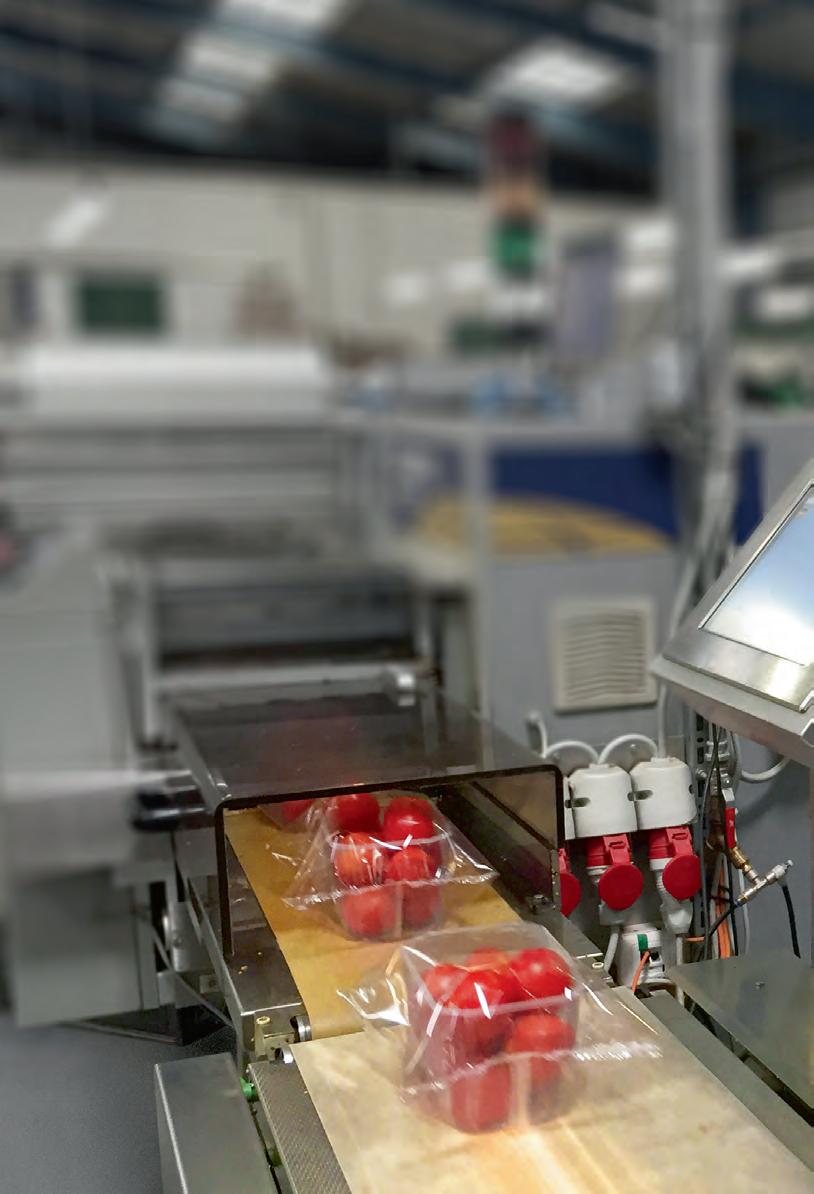
Effective planning and controlling of processes are one of the most important things when it comes to fresh food.

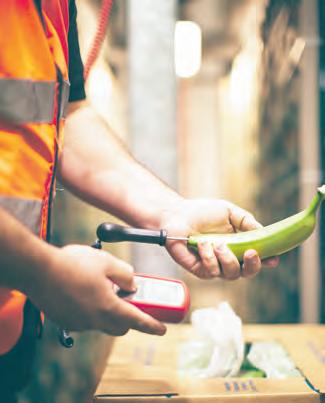
at which location. This is the only way to minimize over- or underdeliveries and the spoilage of goods. Planning is usually based on Excel lists, which then have to be manually converted into orders in the ERP system. The fact that errors happen here can hardly be avoided. The changeover to a database-based solution opens new potential.
The Fruit Import Planning System “FIPS” generates orders based on a
planning quantity and considers live data such as sales quantities, spoilage, lead times, transport times and ripening cycles.
This guarantees supply chain traceability and detailed planning of ripening chamber utilization. Underdeliveries are immediately apparent and appropriate replacements can be provided at an early stage.
In many ERP systems, a comprehensive data exchange and thus a continuous, clear planning and control is only possible to a limited extent. The step towards an industry-specific solution such as “traceNET”, which can map the processes of food-producing
companies, is therefore obvious and necessary. Instead of manual entries, it works with automatisms that make everyday production easier. The complex processes of food producers are mapped and optimised in detail. Crop and harvest reporting, ordering, packaging material planning, batch tracing and certificate management are just some of the comprehensive functions.
Individual software solutions for food producing companies, mobile solutions, realtime overview & business intelligence tools can be found at “activeIT-Software & Consulting GmbH”.
www.active-it.at
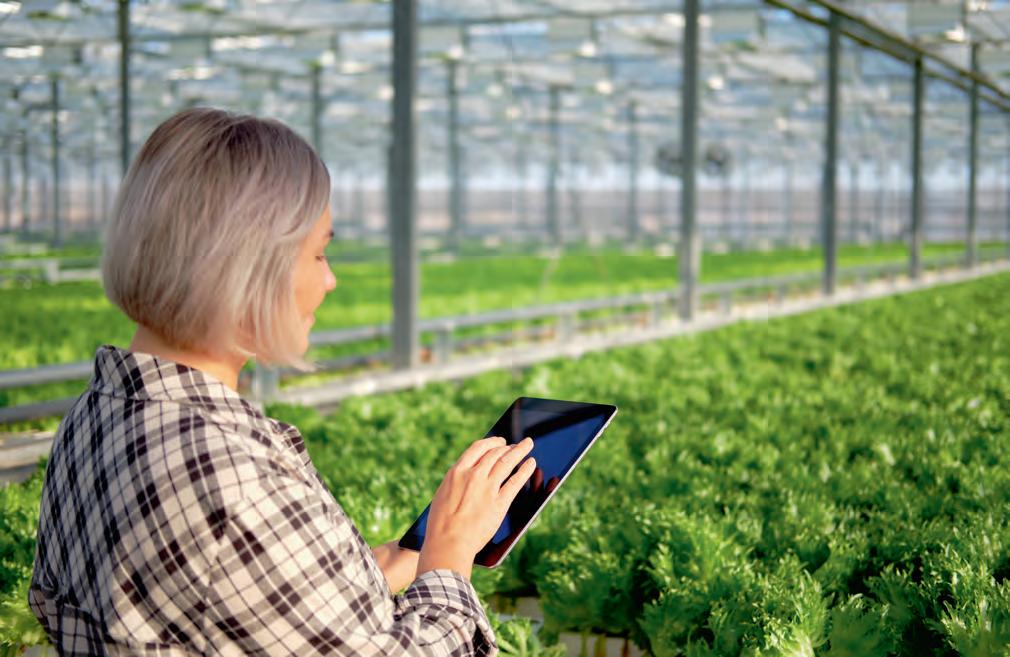
The Pellacini family began their operations at the end of the 19th century in Parma, in what is today known as the Food Valley. Pellacini Engineering has been a key player in all the growth phases of this sector, focusing its production activities exclusively on the canning industry for over a century.
Only authentic, specific, and in-depth know-how enables the offering of effective solutions for productivity, safety, and economic and environmental sustainability.
Pellacini Engineering has always been focused on the canning sector, the client, and the project, thanks to its new exclusive production method: the “Pellacini Tayloring System.” This system eliminates costly production constraints and allows for the creation of tailor-made equipment that perfectly suits each customer. Production is entrusted to carefully selected laboratories specializing in individual processes.
If we want fruit to have a long life, we must preserve and respect the earth that produces it.
That’s why Pellacini Engineering is now directing its research towards sustainability, as evidenced by its well-established projects for the recovery of production waste and the production of pulpers and refiners with rotating sieves.
With its specific experience, gained over more than a century, Pellacini Engineering effectively responds to

the global food processing sector, which demands technologies attentive to energy and production efficiency, as well as environmental aspects.
The historic Pellacini technology is extremely flexible, reliable, easy to maintain, updated, and present in the major international markets: Europe, South America, North Africa, the Middle East, and the Far East. Pellacini’s production ranges across many fields of the process industry,
designing and manufacturing machines and plants for:
- Fruit single-strength purees and pulps, nectars, natural fruit juices, flat drinks, jams, and concentrates made from fruits grown in both temperate and tropical climates;
- Tomato paste, “Passata”, pizza sauce, tomato pulp and cubes;
- Other tomato derivatives, such as ketchup, spicy sauce, and various other sauces;
- Vegetable sauces, pepper sauces,

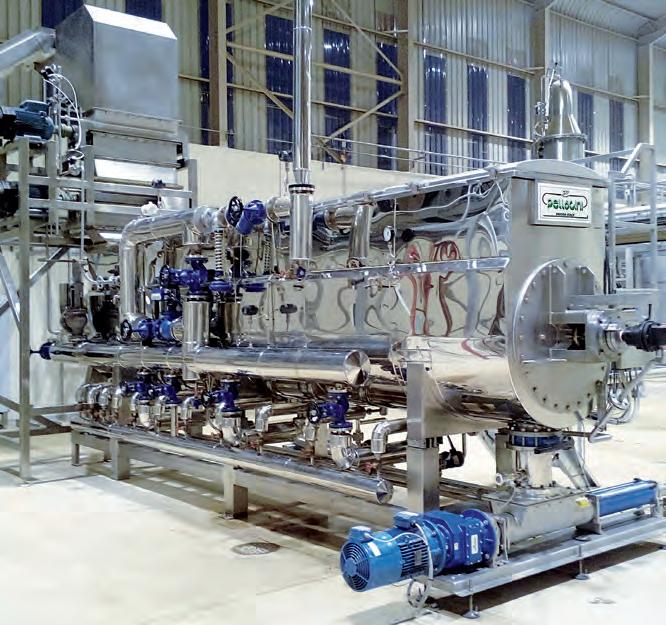
baby food, canned legumes, harissa sauce;
- Production lines for both clear and cloudy juices, starting from fresh products or puree.
Aseptic packaging machines:
- Aseptic fillers in various models featuring one or two heads, suitable for liquid, dense, semi-dense products, products containing pieces, and fruit and tomatoes cut up to 25 mm. These are compa-
tible with flexible aseptic bags of 200 kg (Bag-in-drum) or 1000 kg (Bag-in-bin).
Machines and plants for defrosting and cooking:
- Vacuum cookers for jams with a double bottom and rotating coil;
- Rotating coil defrosters for IQF and products in pieces;
- Blanchers with rotating drums for legumes;
- Cooking groups;
- Continuous multi-effect evaporators for heat-sensitive products, even with high viscosity.
Machines and plants for extraction, milling, and pitting, specifically:
- Centrifugal and turbo extractors for fruits, tomatoes, and vegetables;
- Mills and crushers for fruits and vegetables;
- De-pulpers for peach stones, apricots, cherries, plums;
- Roller pitting machines.
Machines and plants for enzymatic treatments, specifically:
- Specific enzymatic inactivators for fruits and tomatoes;
- Enzyme treatment and dosage groups.
For more information, visit: www.pellacini.com
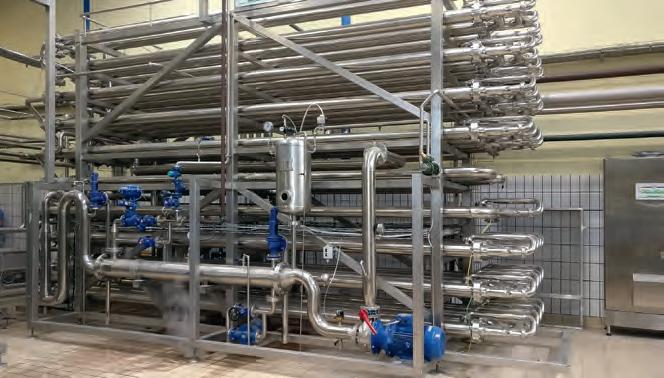
Proseal’s advanced tray sealing machines are helping growers meet everincreasing demand for soft fruit - which has been particularly strong during the current pandemic - by providing high quality, flexible sealing solutions that also deliver on sustainability.
As soft fruit volumes continue to climb, and with the market for fruit grown in the UK now estimated to be worth over £670 million a year, manufacturers are looking for flexible solutions that can meet the demanding highspeed requirements driven by the seasons. Equally important is the need to
minimise the use of packaging materials without impacting on the effectiveness of the pack, in particular its ability to provide product protection to help reduce food waste.
Proseal offers an extensive range of high-quality manual, semi-automatic and fully automatic tray sealers, designed to be flexible and incorporating a number of unique design features that maximise speeds and efficiencies.
In addition, Proseal machines’ twominute rapid-tool-change means endless varieties of tray formats, materials and sizes can be sealed on one
machine, allowing users to quickly switch from one tray type to another.
“Our tray sealing machines offer fruit growers greater flexibility to seal different designs and sizes of trays with efficiency and accuracy,” explains Proseal sales director Tony Burgess.
“This, combined with our innovative technologies and production lead times, make us a world leader in tray sealing soft fruits.
“ProMotion™ our continuous infeed technology, for example, has the potential to increase the speed of a tray sealer by up to 30%, while creating


calm machine operations which ensure a smoother, more stable journey to the sealing station.
This is particularly beneficial to delicate produce, such as soft fruit.”
Proseal also manufactures a diverse and customisable line of intelligent conveyor systems, designed to create ultimate line control and optimisation and therefore perfect for the fast-moving soft fruit industry.
The company has pioneered several important sustainability initiatives
throughout its 23 years. Proseal was the driving force behind the replacement of traditional clam-shell punnets with top film sealed varieties, which has now become commonplace in soft fruit markets across Europe and now North America, helping to minimise plastic usage by around 45% in most cases.
More recently, the company has been at the forefront of the introduction of new recyclable and compostable trays and film for fruit that can further reduce plastic usage by as much as 96%.

“Proseal continues to strive to develop the most effective and sustainable sealing solutions for its customers,” concludes Tony Burgess.
“We are proud of the many innovations we have developed for the effective and efficient tray sealing of soft fruit. And we will continue to develop the appropriate technologies to help support sustainable solutions that deliver quality.”
Proseal is part of the JBT Corporation family, a leading global technology solutions provider to high-value segments of the food processing industry, committed to providing a service that surpasses customer expectations.
www.proseal.com
www.jbtc.com
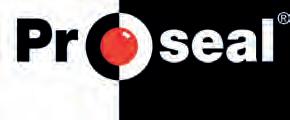
“
Ready-to-eat fresh produce, known as the fourth range, is synonymous with convenience and freshness and represents one of the most dynamic and growing sectors in the food industry
Behind the apparent simplicity of a bag of salad or a mix of washed vegetables lies a highly sophisticated production process where quality control is central to ensuring consumer safety and satisfaction.
In recent years, technologies for quality control have made significant advancements, transforming how fourth-range products are selected and processed. State-of-the-art optical scanners are now capable of identifying imperfections or contamination in products with

by Walter Konrad
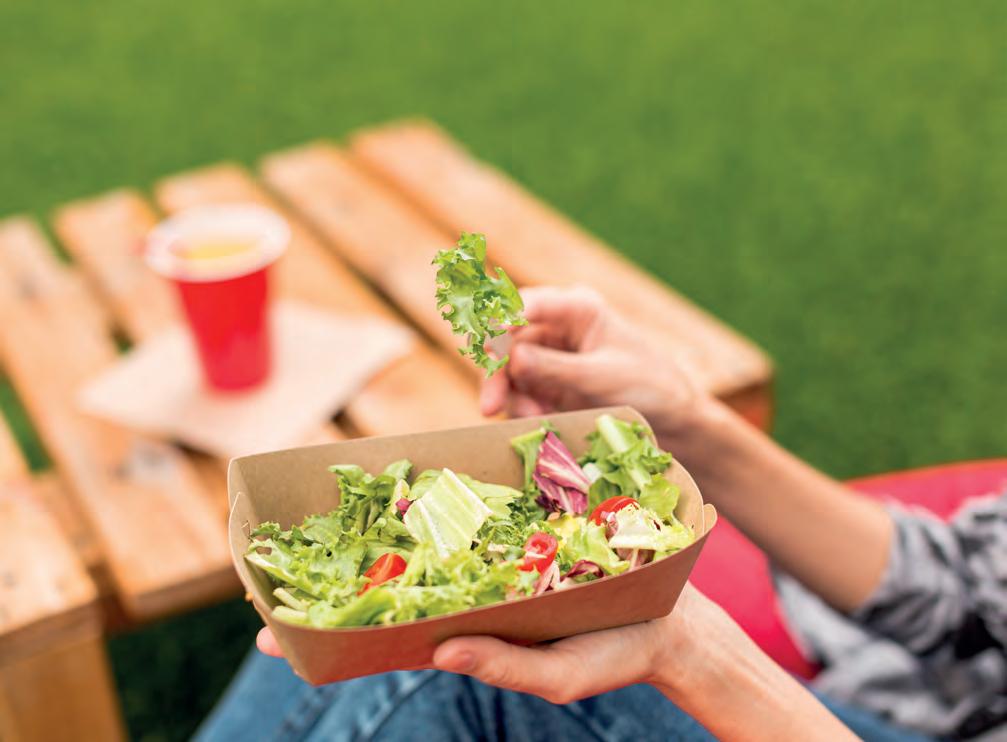

extraordinary precision. Using multispectral lighting and artificial intelligence, these machines can detect anomalies invisible to the naked eye, such as traces of bacteria or chemical residues, thereby elevating food safety standards.
Another area of innovation is non-invasive analysis techniques.
Advanced sensors can monitor parameters such as humidity, temperature, and product ripeness without damaging it, providing real-time information that helps optimize the production process.
These tools are particularly useful in reducing waste, ensuring that only perfectly compliant products reach the end consumer.
Automation is also revolutionizing the processing phase. Robotic production lines equipped with artificial vision systems can handle large volumes of products with previously unimaginable precision and speed.
This not only improves operational efficiency but also reduces the risk of human error, ensuring consistent and reliable quality.
Traceability is another central theme.
Digital systems based on blockchain technology are also finding applications in the fourth-range sector, enabling monitoring of every stage of the process, from harvesting to distribution.
This transparency not only increases consumer trust but also provides a valuable tool for quickly addressing issues or product recalls.
The impact of these technologies on overall sector efficiency is significant. By reducing machine downtime and optimizing resource use, innovations in quality control help make the fourth-range sector more competitive and sustainable. At the same time, automation allows companies to respond more quickly and flexibly to market demands, which increasingly require fresher and more personalized products.
In a sector where quality is everything, investing in advanced technologies is not just a strategic choice but a necessity to keep pace with consumer expectations and ever-stricter regulations.
The fourth range, a symbol of convenience and innovation, continues to demonstrate how technology can be an essential ally in ensuring freshness, safety, and sustainability.
The distribution of the LINBO® branded mandarin has begun and it will be a qualitatively exceptional campaign: the medium-late Linbo® branded mandarin has started the 2024 season and the expectations are the best, as explained by Francesco Paolo Gallo, president of the Consortium who expresses the premium brand. “At a qualitative and quantitative level the prospects are excellent and we will reach the consumer with our 3 lines: conventional, zero residue and organic.
The latter two together are worth 40% but the objective year after year will be to significantly increase the share linked to the zero residue.
To reach the targets we have worked and are working hard in our citrus groves with our technicians”.
The consortium, which is based in Massafra (Taranto), was created to create a club that includes Italian producers of premium mandarin varieties, including the Tang Gold variety, with the aim of guaranteeing consumers a premium, sustainable and 100% product Made in Italy.
Linbo® is synonymous with quality and sustainability, it represents a premium product which, on the basis of the rigid production regulations to which all the producers of the consortium adhere, will offer a fresh fruit with a very high shelf-life to our

consumers, in total respect of environment. The entire Linbo® product is totally traceable from the consumption table to the tree, in this way the consumer can be certain of the origin and specific
agronomic techniques adopted for the production of the single mandarin he purchases.
The product will be distributed by commercial partners Carpe


Naturam, Giacovelli, Orchidea Frutta and Zuccarella Cooperativa. The numbers are growing: “This year the consortium has expanded -Francesco Gallo points out - with the entry of 11 other companies which bring the total number of associated producers to 36. The club is proceeding quickly: we expect to reach a harvest of over 4,000,000 kg”.
In short, creating a system in the citrus sector in Southern Italy
is possible: “Linbo is a unique independent aggregation reality in Southern Italy and is ensuring good results also in economic terms. Speaking of prices, we are recording better prices than last year due to the high quality and size of the calibres, which will be decidedly higher, with great product uniformity”. A uniformity favored by the climate which, unlike other crops, has not compromised the normal development of the
fruit: “No damage from hail or other weather-related problems”, from a phytosanitary point of view the technical coordination has achieved excellent results, he notes Francesco Paolo Gallo again. “All of us members are very happy that our project is becoming an important reality, we are optimistic that we are going in the right direction”.
www.linbo.it
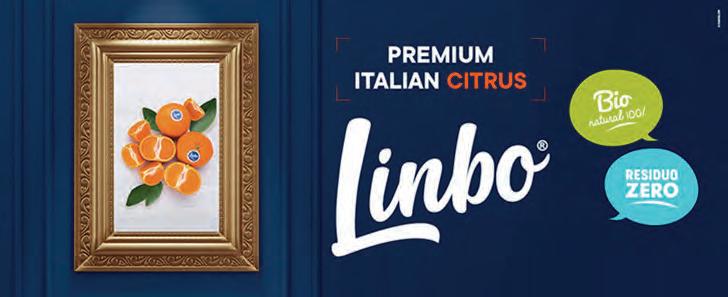

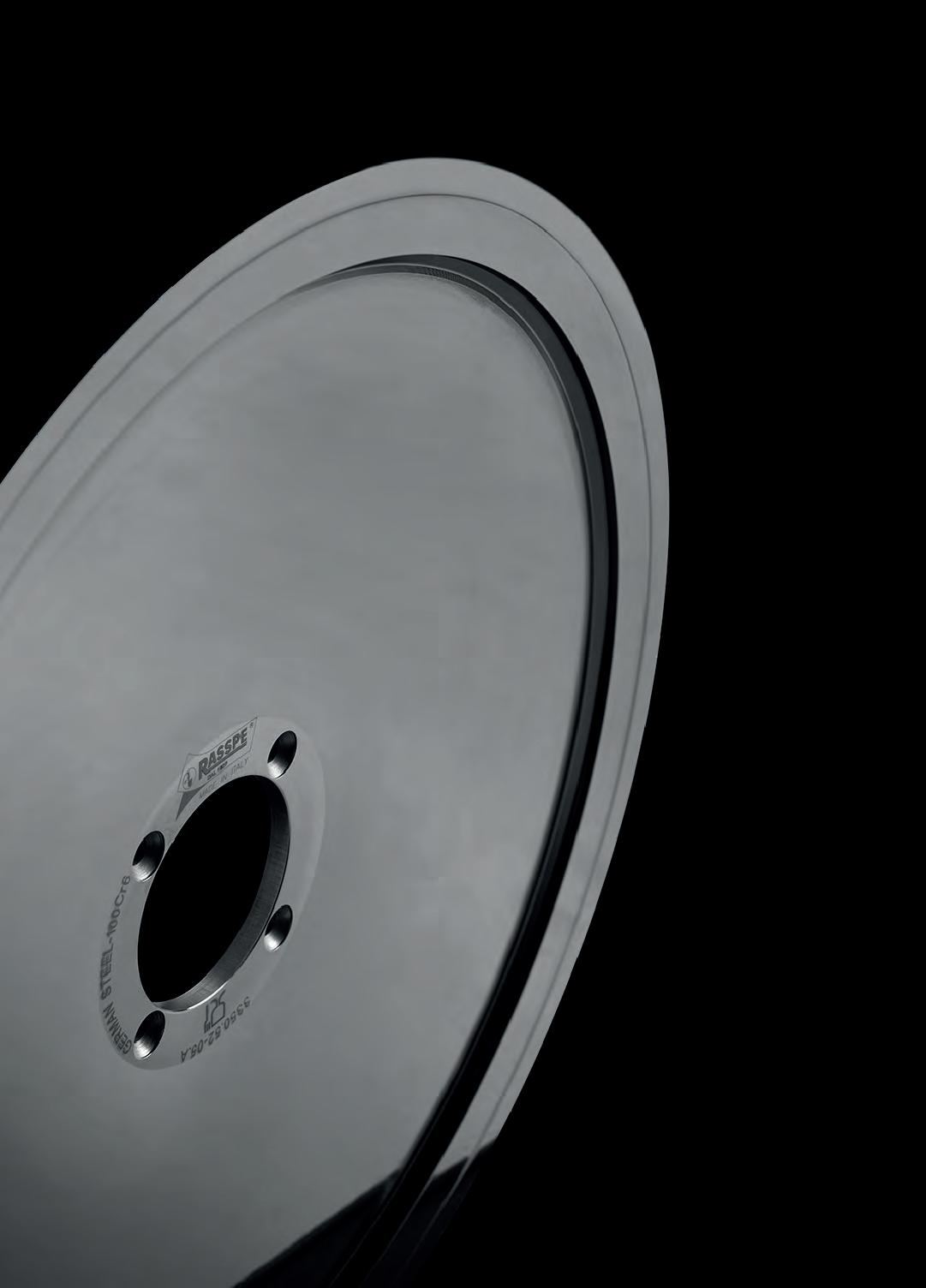



RASSPE Blades is a unique symbol of history and innovation: the most ancient brand of blades for slicing machines was established in 1827 and shines nowadays within the innovative environment of CHIARAVALLI Group.
Today, in fact, RASSPE Blades are a 100% Made in Italy excellence prod-
uct that joins 30 years of craftsmanship know-how with the productive strength of a multisectoral Group.
Starting from the design of each model, passing through the study of the numerous phases of production, up to their development and application, everything is based on the passion for a unique product.
Each step is the outcome of years of experience and constant innovation dedicated to refining each detail that pours into unmatched quality blades for slicing machines.
What makes RASSPE a leading player in its sector is not just quality: thanks to the latest productive machines, more than 30 000 blades are monthly pro-


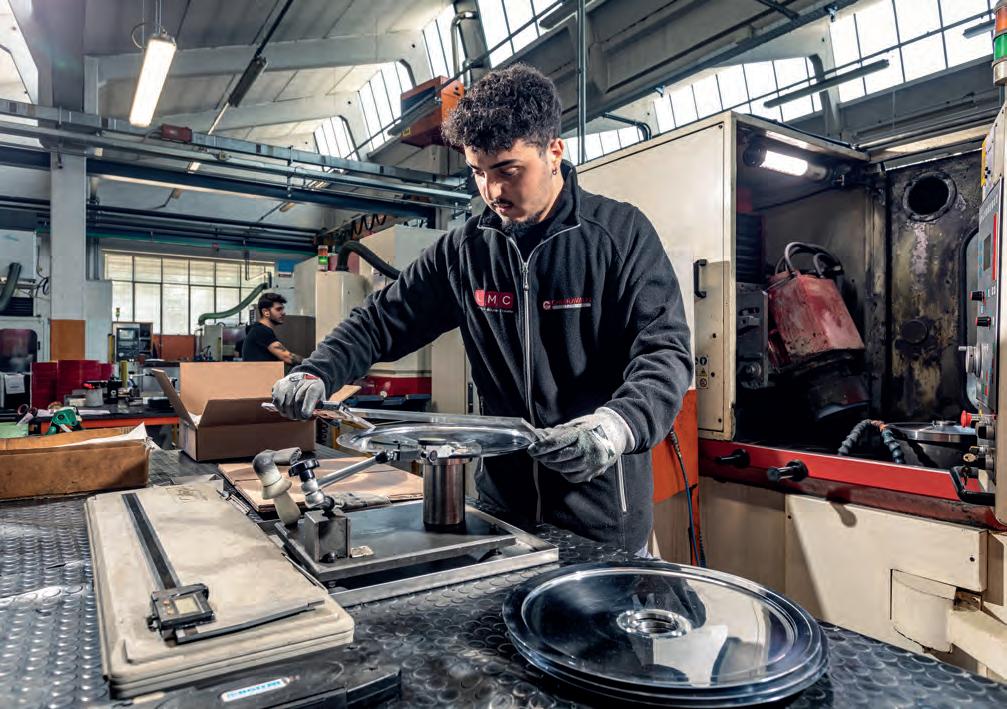
duced in the group plants to grant the supply of a vast warehouse to support all customers in such a complex macro-economic context.
Serving worldwide customers, RASSPE Blades perfectly embodies the idea of a group with an Italian heart that deals on the global stage.
Such expertise within the food industries represents for the group a fun-
damental asset: RASSPE team will be leading the Food Division of the Group, founded to expand the range of products offered to the alimentary sector.
From tensioners and open transmission components to electric motors CHIARAVALLI Group manages various products that are at the foundation of the food industry machines and that thanks to RASSPE expertise
represent a tangible opportunity for growth for all the group.
Founded on past success, fueled by the actual challenges, and projected towards the future, CHIARAVALLI Group has in RASSPE one of the gems that shines and will shine even more, just like one of its stunning blades.
www.chiaravalli.com

Verinox is a reliable partner in the design and construction of thermal treatment plants for the food industry. The company made thousands of different solutions, in 50 years of continuous innovation.
The Verinox experience is based on thousands of plants designed, custom-built and installed in food industries around the world to give voice to typical food products and tasty recipes. Plants for the heat treatment of food products, such as counterpressure ovens or cooking and cooling tunnels, allow the setting of recipes, parameters and techniques necessary to obtain cold cuts, Meat, cheese, vegetables or ready-to-eat dishes cooked at the right point, in a healthy, efficient and fast way.
The focus on energy saving and plant efficiency is the main driver of production line design, Verinox analyses the production flows, timing, temperatures and recipes of the food industry, with the aim of optimising and making them more efficient. No detail is left to chance, so you can reduce the use of energy and human resources, avoid waste and unnecessary time. For this reason, in addition to building plants that last over time, Verinox maintains a constant relationship with customers
and provides support even remotely.
But there is more. Verinox renews food production plants that are technologically obsolete and not up to the production standards required by the market. Revamping can be performed both from the electrical and electronic point of view, introducing in the operation management, programming and control of new technologies that allow control through software and state-of-the-art control panels. The partial or complete upgra-


de of the electrical, electronic and in some cases also mechanical parts is intended to extend the life of the plant making it more efficient.
Verinox represented the technology and food equipment that has transformed the culinary tradition of craftsmanship into industrial, generating machines increasingly solid and performing, introducing techniques to produce ambitious recipes, large quantities and very high product quality.
At the last IFFA, Verinox was remembered by professional visitors for some innovations presented: for example, the Iroxfry Tunnel. A continuous cooking, roasting and frying plant. Frying and browning of many products without oil, thanks to infrared technology. Reduces the use of oils - and thus avoids the disposal route - to put on the table healthier products, following the market trend.
The steam counterpressure oven, on the other hand, uses high temperatures, pressure and cooling and allows to cook or pasteurize quickly in one step. Minimising the bacterial load of food and reducing production times. It is the ideal system for preparing ready-toeat dishes or vacuum-packed foods, an increasingly strong trend in food distribution.
Verinox talks with producers and listens to consumers, so that even in this next edition of IFFA 2025 will have the opportunity to tell you a lot about itself, to meet the customers’ need to produce more efficiently,
sustainable and advanced technologies and guarantee consumers healthy and high-quality processed products.
For further information: www.verinox.it

As the global food processing industry continues to prioritize hygiene and efficiency, Clean-Geartech is proud to present its innovative range of stainless steel motors and gearboxes, designed with cutting-edge hygienic features.
Featuring motors ranging from 0.12 kW to 3 kW, available in 2, 4, and 6-pole configurations (B14, B5, and B34), and robust stainless steel gearboxes, Clean-Geartech’s solutions are the ideal choice for applications that require the highest standards of cleanliness, reliability, and performance.
At IFFA Frankfurt, Clean-Geartech will showcase its comprehensive range of products, specifically engineered to meet the demanding needs of the Food and Beverage industry.
Whether you’re looking for highly efficient gear reducers or motors that withstand frequent washdowns,
Clean-Geartech delivers made in Italy, reliable, hygienic solutions to power your operations.
Why choose Clean-Geartech’s hygienic motors and Gearboxes?
1. Complete stainless steel construction for hygiene and durability: CleanGeartech’s motors and gearboxes are made from AISI 316 stainless steel, a premium material known for its superior resistance to corrosion, durability, and ease of cleaning. With the food industry’s strict hygiene requirements in mind, our products are designed with smooth surfaces, rounded edges, and no crevices where contaminants could accumulate, making them perfect for environments where hygiene is paramount.
2. Advanced hygienic design: the hygienic design of CleanGeartech’s motors and gearboxes
helps to reduce the risk of contamination, making cleaning quick and efficient. These products are specifically engineered for industries like Food processing, where sanitation is crucial, ensuring compliance with the highest industry standards, such as NSF and UL certifications.
3.High-efficiency Gearboxes for every application: our range of gearboxes includes solutions for all your needs. Clean-Geartech offers worm gearboxes and high-efficiency bevel gearboxes, all designed for maximum reliability and performance. These gearboxes, built with AISI 316 stainless steel, are engineered for durability and precision, ensuring smooth operation even under high-stress conditions. The high-efficiency bevel gearboxes are ideal for reducing energy consumption,

making them a sustainable choice for any food processing facility.
4. Wide motor range for flexibility in Your Production Line: Clean-Geartech’s motors cover a wide power range from 0.12 kW to 3 kW, available in 2, 4, and 6-pole versions to suit various speed and torque requirements. Whether your application requires a compact motor or a more powerful solution, Clean-Geartech’s motors are designed to fit seamlessly into a wide variety of food processing machinery, offering the flexibility you need to optimize your production line.
5.Efficiency and reliability in every detail: our products are not only designed with hygiene in mind but also for superior performance. Clean-Geartech’s motors and gearboxes are built for continuous, high-performance operation. With features like smooth and easy-to-clean surfaces, our equipment helps to minimize the risk of downtime and contamination while maximizing productivity.
6. Easy maintenance and low downtime: CleanGeartech’s hygienic motors and gearboxes are built for easy maintenance, with features that

simplify inspection and cleaning. This design reduces the need for extensive downtime and minimizes the time spent on maintenance, helping your production line stay operational without disruptions.
Clean-Geartech at IFFA Frankfurt: Your Partner for Hygienic Innovation At IFFA Frankfurt, Clean-Geartech will be exhibiting its premium range of hygienic motors and gearboxes, designed to meet the toughest standards of the food industry. Our team will be on hand to demonstrate how these innovative solutions can improve your operations, increase
energy efficiency, and maintain the highest hygiene standards. Whether you are upgrading your existing systems or installing new equipment, Clean-Geartech is the trusted partner you need to enhance performance, hygiene, and efficiency in your food processing facility.
Visit Clean-Geartech at IFFA Frankfurt to Discover Our Latest Innovations. Clean-Geartech – Hygienic, Efficient, and Reliable Solutions for the Food Industry.
Visit our website www.cleangeartech.com


Universal Pack, a leader in packaging machines and automated lines for singledose solutions, promotes sustainable practices in the food industry. Their innovative approach ensures compatibility with compostable and recyclable laminates, balancing efficiency with environmental responsibility.
Universal Pack focuses on optimizing machines to work seamlessly with compostable, recyclable, and recycled materials. Using Life Cycle Assessment (LCA) to measure environmental impact, they prioritize ecofriendly processes at every stage of production. Collaborations with global film suppliers and major corporations allow the company to deliver turnkey solutions that align with environmental standards.
designed to minimize energy use, ensuring that the entire packaging process has a reduced carbon footprint. This holistic approach reflects Universal Pack’s dedication to the environment while providing customers with a competitive edge.
Partnerships are key to Universal Pack’s success. By working with film suppliers, customers, and universities, they develop advanced, sustainable laminates and ensure optimal
performance on their machines. These collaborations drive innovation across the industry, setting new standards for environmentally responsible packaging.
Universal Pack’s in-house lab, Universal Lab, has been pivotal in testing over 350 sustainable laminates and refining machine designs for maximum efficiency. Combining 30 years of research with cutting-edge technology, Universal Lab guarantees that every solution upholds product integrity while meeting sustainability goals. In addition to materials testing, Universal Lab conducts durability and performance analyses to ensure that packaging maintains product integrity. Whether it’s for powders, liquids, or semi-solids, the lab’s rigorous testing guarantees that every package withstands the demands of real-world distribution, helping to reduce food waste and ensure freshness.

Universal Pack designs and manufactures highend packaging machines and automated lines for single-dose formats

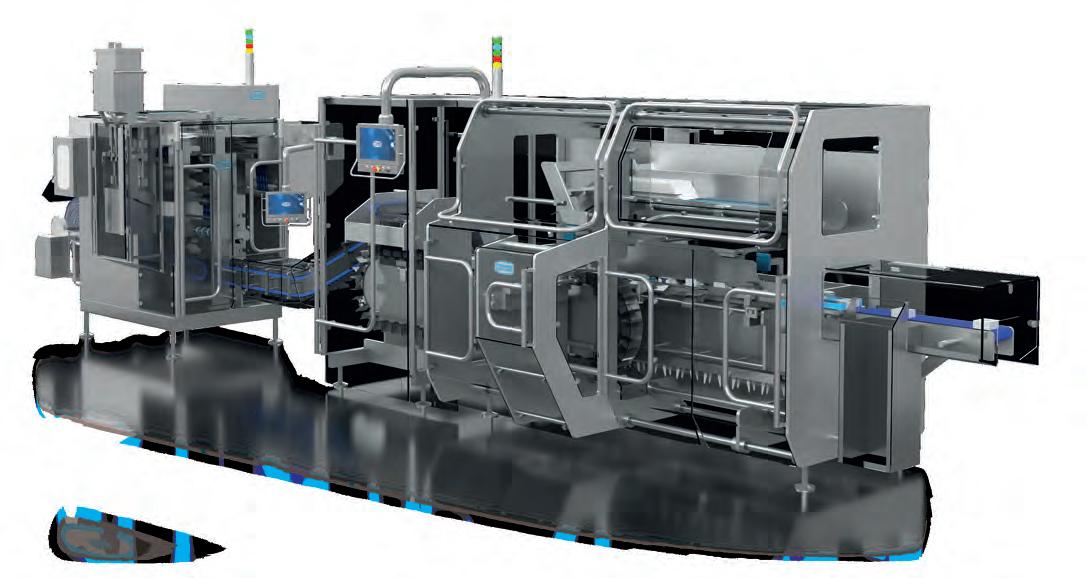

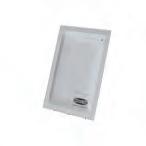
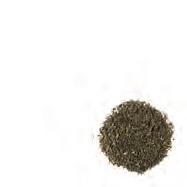







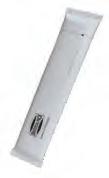



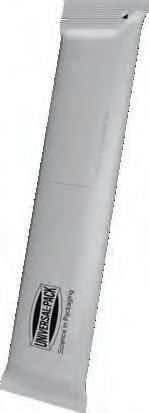




such as stick-packs and sachets. Its top-tier machines, optimized to work with compostable and recyclable materials, serve a variety of industries, especially the food market. The flexibility of their equipment allows manufacturers to transition seamlessly to eco-friendly solutions while maintaining high production speeds and precision.
Their machines are not only reliable but also scalable, capable of supporting businesses of all sizes, from small producers to large multinational corporations. With customizable features, Universal Pack ensures that their systems meet the specific needs of each client, further enhancing their reputation as a leader in sustainable packaging technology.
With 60 years of experience and 8,000 systems in more than 150 countries, Universal Pack leads in packaging solutions for the food industry. Their machines can handle all the products ranging from powders and granules to viscous and liquids, ensuring sustainable packaging options for a wide array of food products.
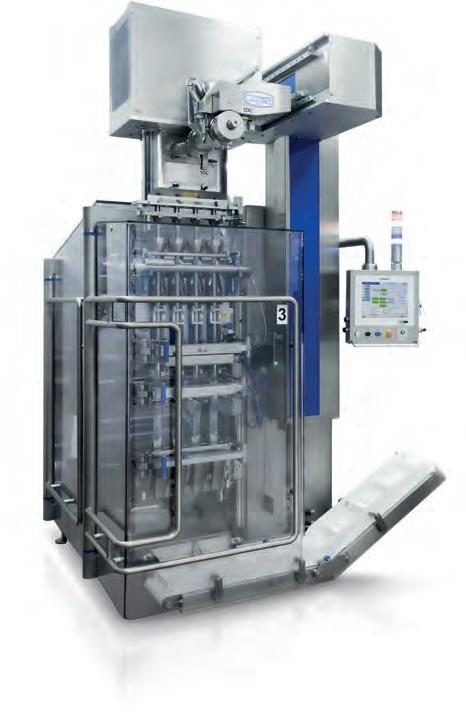
Universal Pack’s expertise extends to diverse food applications such as dairy, sauces, spices, sugar and coffee, showcasing their versatility and adaptability.
Whether packaging instant coffee sticks or mayonnaise sachets, their machines deliver precision and su-
stainability for every product. As sustainability becomes more important, Universal Pack remains at the forefront, offering innovative solutions for environmentally conscious packaging.
www.universalpack.it




Dolcezze Savini is a company based in Tuscany that for three generations has passionately been working in the art of bread and pastry making, using old processing techniques and carefully selected ingredients. From its factories in Valdarno, for over fifty years Dolcez-
ze Savini has been baking high-quality products such as the famous bread cooked in a wood-burning oven, made with Tuscan wheat.
In addition to the different varieties of bread and pizza made with different types of flour, the Valdarno brand bo-


asts a rich pastry production that also includes the typical traditional pastries from Siena produced by the historic company Fiore 1827, acquired by Dolcezze Savini in 2017.
Among these specialities there are three important IGP products: two of them are from Siena and they are Panforte and Ricciarelli, while the almond biscuits named Cantuccini are linked to the Tuscan territory. For a long time, Dolcezze Savini has focused its activity on a production that pays particular attention to the importance of some elements such as natural ingredients, reduced gluten products, palm oil-free products and a clearer labelling system.



The current size of the company, which counts more than a hundred employees in total, has not affected the original characteristics of Dolcezze Savini, confirming its vocation for craftsmanship, its dedication to quality and its desire to be at the forefront of the technology used in its factories.




In this regard, in 2019 the company built a new production plant of over 4,000 meters with the clear intention of investing in technological innovation. Alongside the integration of two new semi-automatic lines for the production of partially baked bread, the new investment has opened more space for


artisanal production with the strengthening of the production of handmade pizza dough. The company has also developed a complete electronic management system, making it part of the world of industry 4.0. This innovation process has found full achievement in the strengthening of its packaging
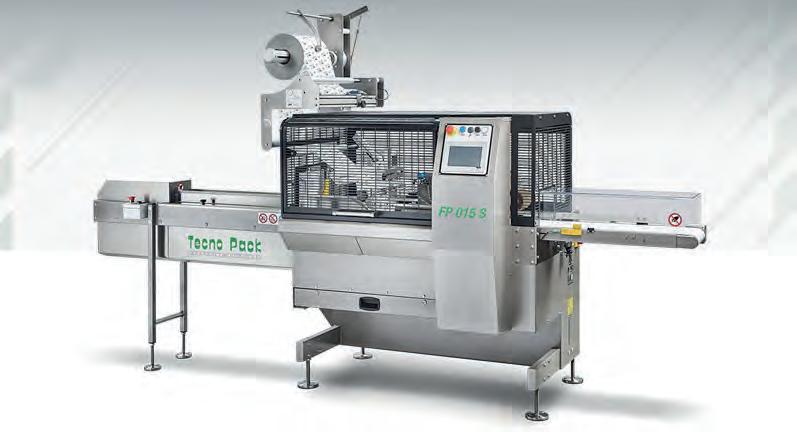
sector, for which Dolcezze Savini has called upon the group Tecno Pack, a leading company in the supply of packaging technologies.
For over 30 years Tecno Pack has been designing, manufacturing and distributing horizontal packaging machines and automatic packaging systems for the food industry and other sectors. Tecno Pack is a group of companies including Tecno Pack, IFP and GSP. Based in Schio, in the pro-
vince of Vicenza, Tecno Pack stands out for being a pioneer and innovator in the packaging industry, developing cutting-edge solutions, increasing the digitalization of machines and plants, offering its customers excellent results with limited investments.
The partnership between Tecno Pack and Dolcezze Savini has resulted in the development of three packaging lines, specifically designed by the group for the bread sector of the Tuscan company. These, in detail, are

the new packaging lines implemented in the production system of Dolcezze Savini: •Monopiega Diamond 650 wrapper. This is an innovative and highperformance shrink wrapping machi-
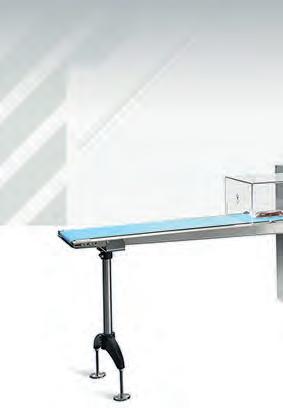

ne, designed to wrap small, medium and large-sized items as well as thin solid products;
• Flow pack ATM FP 025 line suitable for pizza dough and ideal for “pinsa” (a traditional pizza made with an ancient Roman recipe). This horizontal packaging machine is specific for modified atmosphere packaging thanks to the tight packs granted by the sealing system. It is the most suitable flow-wrapper when aesthetically good-looking packages with high-quality side gussets and thick wrapping materials are required;
• The FP 015 line for sandwiches. This horizontal pillow pack wrapper
has a particular cantilevered frame with easy accessibility that helps sanitation, both for hygienic and maintenance reasons, guaranteeing full safety at work.
At the same time, the historical production carried out by Fiore 1827 was also implemented with the purchase of a vertical + multi-head packaging machine to improve the type of packaging and achieve greater production efficiency.
With the selection of these tailormade solutions, designed according to the production needs of Dolcezze Savini, the Tecno Pack
group not only proves to be a leading manufacturer in the sector of packaging machines and systems but also confirms to be the ideal partner to integrate new technologies created as “tailor-made” solutions according to specific automation requirements
The precious and fruitful collaboration between the Tecno Pack group and Dolcezze Savini represents the utmost expression of the most recent technological innovation combined with traditional working procedures for the production of a great variety of quality products with an authentic artisanal flavour.
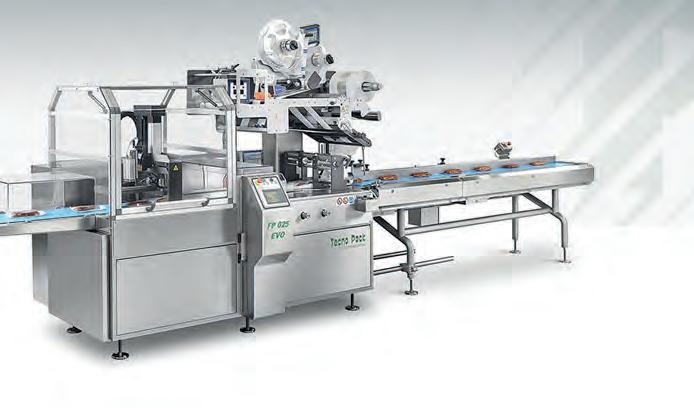
Every day, distributors, branded companies, industrial enterprises, and the packaging sector worktirelessly to achieve their packaging goals.
Among these, climate targets are particularly ambitious and need to be met in a very short time. The challenge is considerable, but the industry is determined to turn this necessity into an opportunity to innovate and improve.
In recent years, awareness of the environmental impact of packaging has grown exponentially. Consumers are increasingly attentive to sustainable choices, and companies must respond to these new needs with innova-

by the editorial staff

tive solutions. The European Union, for example, has established that by 2030 all packaging must be reusable or recyclable in an economically sustainable way. This directive has pushed many companies to review their production processes and invest in research and development.
One of the most promising approaches is the use of biodegradable and compostable materials.
These materials, derived from renewable sources, can naturally degrade without leaving harmful residues in the environment. However, their large-scale production still presents several challenges, including high costs and the need for adequate infrastructure for composting management. Despite this, many companies are successfully experimenting with new materials, demonstra-
ting that a transition to more eco-friendly packaging is possible.
Another crucial aspect is the reduction of plastic use. Plastic, although a versatile and convenient material, is one of the main contributors to environmental pollution. Microplastics, in particular, pose a significant threat to marine ecosystems and human health.
To address this issue, many companies are reducing the weight of plastic packaging and seeking more sustainable alternatives such as glass, metal, and paper.
Technological innovation plays a fundamental role in this process. For example, the adoption of advanced printing technologies allows for waste reduction and improved production efficiency. Additionally, the use of

smart sensors in packaging can help monitor the quality and freshness of products, thereby reducing food waste.
Collaboration among various stakeholders is essential to achieve climate goals. Companies must work closely with material suppliers, governments, and nongovernmental organizations to develop sustainable solutions that are economically advantageous and accepted by consumers.
Circular economy initiatives, which promote the reuse and recycling of materials, provide a concrete example of how collaboration can lead to positive results.
Furthermore, consumer education and awareness are crucial. Companies need to transparently communica-
te their sustainability efforts and engage consumers in the process. Awareness campaigns and incentivized recycling programs can help create a culture of sustainability that goes beyond the mere act of purchasing.
The packaging sector is facing a historic challenge. Climate goals are ambitious, but they also represent a unique opportunity to innovate and transform the industry.
With the commitment and collaboration of all stakeholders involved, it is possible to create a future where packaging is sustainable, safe, and convenient for all. The packaging industry can not only significantly contribute to the fight against climate change but also become a model of sustainability for other industrial sectors.











For start-up drinks brands, packaging isn’t just about housing products – it’s about making a statement. In a crowded market where countless products vie for consumers’ attention, the right packaging can elevate your brand, create a memorable customer experience, and drive sales.
Paper-based tubes do more than just protect your product; they set the tone for your brand. With a sleek, premium appearance, sustainable materials, and the strength to safeguard even the most delicate drink bottles, these tubes are the ultimate choice for start-ups committed to quality, reliability, and sustainability. They help you stand out, impress, and build a lasting brand.
1.Cardboard tubes premiumise products and boost shelf appeal
Paper-based cardboard tubes showcase premium quality, making them the perfect choice for supercharging shelf appeal. Their cylindrical design creates a high-end feel that not only stands out on shelves but creates a coveted sense of craftsmanship and exclusivity.
As a start-up striving to establish yourself as a premium brand in a competitive market - with many new brands on the block already successfully making their mark (Kantar) - cardboard tubes with lids reinforce the idea that your brand prioritises superior quality and attention to detail.
2.Cardboard tubes give start-ups a competitive edge
Unique packaging creates a lasting impression, and cardboard tubes are the perfect way to make your brand
unforgettable. In a sea of drinks brands all competing for the same customers, the visual appeal and tactile feel of cardboard tubes allow your product to grab attention and instantly connect with consumers. What’s more, not only do they look and feel great, but paper-based cardboard tubes are also a sustainable packaging solution. With 75% of consumers saying they are more likely to purchase from brands that offer green or sustainable products (Deloitte), this presents a massive opportunity for your brand to capture the attention of eco-conscious shoppers, giving you an edge over competitors that haven’t yet embraced packaging that’s kinder to the planet.
3.Paper-based cardboard tubes provide unmatched product protection
Cardboard tubes enhance product protection by offering durable and reliable packaging that protects drinks, particularly during transit. Packaging tubes help products arrive in perfect condition, reducing the risk of breakage or damage. This is important for any brand, but for start-up brands selling premium or limited edition drinks, you get one chance to make a good first impression. Cardboard tubes give you the peace of mind your products will stay safe and secure during shipping, so they’ll reach customers in one piece. That means a more positive and memorable unboxing experience
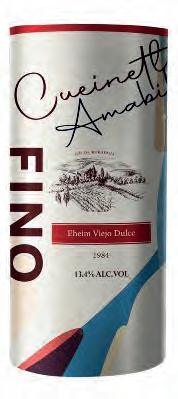
for customers, not to mention reduced returns and their associated costs.
4.Branded tube packaging enhances perceived value and the unboxing experience
Cardboard tubes elevate the perceived value of your products instantly. Customers naturally associate durable, stylish packaging with luxury, and the premium look and feel of a cardboard tube creates that high-end impression before they even open the product. This packaging sets your product apart and gives it the edge it needs to shine on shelves and retail environments. With
the addition of embellishments such as foil stamping, embossing, and spot UV, you can enhance the tactile and visual appeal, adding even more sophistication to your packaging.
These details contribute to a richer, more engaging experience, making your product feel even more premium in the eyes of consumers.
Packaging plays a hugely important role in the unboxing experience, with nearly half of shoppers in the UK thinking so (Internet Retailing).
Cardboard tubes enhance this experience, turning a simple unpacking task into a memorable and exciting moment. The unboxing experience created by custom drinks tube packaging can boost your marketing efforts by leading to positive customer reviews and social media shares and
keeps customers coming back and buying from you time and time again.
5. Packaging tubes for drinks are ideal for gift-giving 52% of adults in the UK have bought alcoholic drinks as a gift for someone in the past (Mintel) and printed cardboard tubes play an important part in the experience. Paper-based cardboard tubes and ready-to-gift packaging mean there’s no need to use any additional gift wrapping.
Consumers crave convenience, so drinks tubes are particularly convenient when purchasing drinks as gifts for family and friends. For start-ups, this is beneficial during holidays or special occasions, as the premium packaging enhances the overall gifting experience and can be the deciding factor that pips competitor products to the post.
Paper-based tubes offer endless possibilities for customisation, making them perfect for seasonal or limited-edition releases that boost their appeal as unforgettable gifts.
For start-ups, cardboard tubes open the door to exciting special promotions and collaborations, ensuring your products stand out during peak gifting seasons.
With durable, sustainable and flexible paper-based cardboard tubes, your brand can create buzz and drive sales with exclusive, eye-catching designs that customers won’t be able to resist.
Find out more by speaking to our packaging experts, who are ready to help your start-up make a splash with paper-based tubes.
www.smurfitwestrock.com













As the Packaging and Packaging Waste Regulation (PPWR) approaches its finishing line, the carton and cartonboard industry further strengthens its leadership in sustainability and circularity. Years worth of discussions have culminated in a robust legal framework that sets the stage for long-term investment decisions, creating opportunities to advance environmental goals and drive innovation.
At Pro Carton, we firmly support the PPWR, recognising its role in shaping a sustainable future for the entire packaging sector. By building on the proven strengths of cartonboard, we aim to meet ambitious targets whilst addressing today’s environmental challenges.
The cartonboard industry has long embraced circularity as the cornerstone of sustainable packaging. Cartonboard, made from renewable resources, is a trusted material with a well-established collection and recycling infrastructure. Significant progress has been achieved in recent years, with CO2e emissions associated with folding carton production reduced by 24% between 2018 and 2021. This reduction reflects the industry’s investments in minimising waste, increasing the share of renewable energy, and managing resources responsibly.
Meanwhile, the Pro Carton „Rethinking Packaging“ - Consumer Survey, 2024 highlights strong consumer con-
fidence in cartonboard packaging, with 88% of respondents trusting the collection and recycling systems in place – a figure that has surpassed glass for the first time, which stands at 85%. This trust is supported by an impressive recycling rate of 83.2%, underscoring the effectiveness of the existing infrastructure.
The cartonboard industry is more determined than ever to push these achievements further, setting an ambitious target to raise the bar and increase the recycling rate to 90% by 2030. This goal is attainable through a collective effort, innovation, and the commitment of all stakeholders in the value chain.
Achieving higher recycling rates hinges on several factors that demand
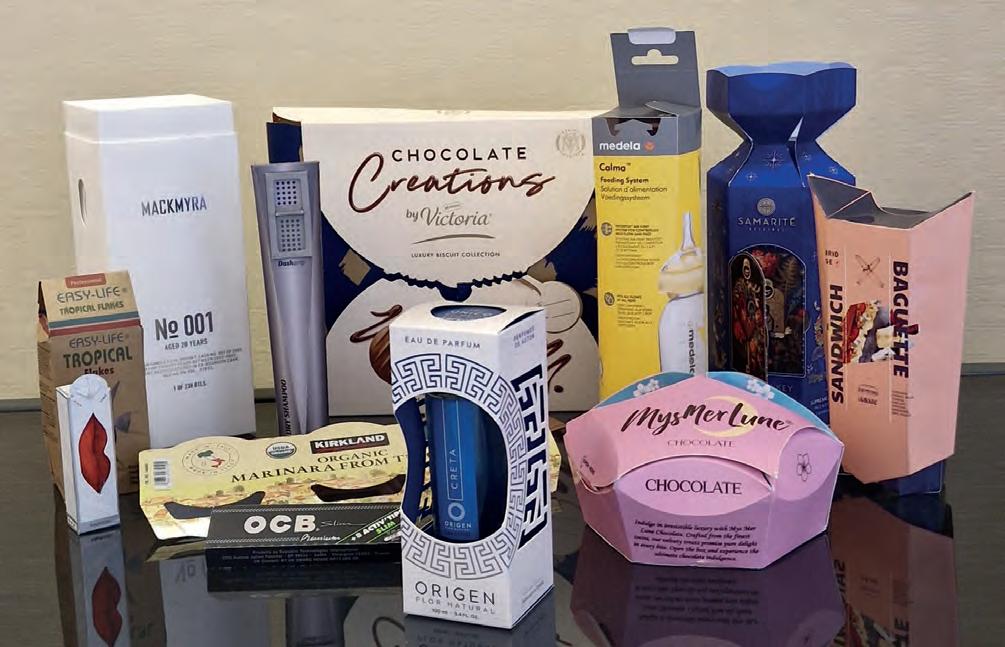

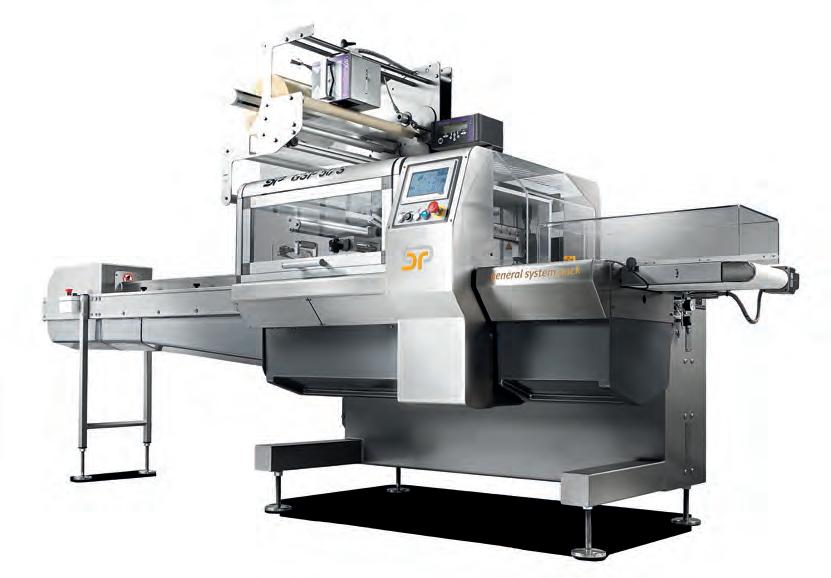

attention and action. Firstly, the separate collection of fibre-based materials is essential to maximise recycling results. Ensuring these materials are kept distinct during collection helps avoid contamination, preserving their integrity and suitability for recycling. Effective resource management also plays a vital role. Fibre based materials are valuable also end of life and should never end up in general waste. By strictly separating these materials at the source, they can be efficiently processed and recycled into new packaging, contributing to a circular economy.
Additionally, harmonisation across European collection systems is another key element.
Whilst mandatory collection targets at the country level can help improve recycling rates, they will not always be necessary. A disciplined approach within the value chain – where fibrebased materials are consistently
treated as precious resources – can achieve similar results without adding regulatory complexity.
The progress made by the cartonboard industry so far is proof that innovation, collaboration, and a shared commitment to sustainability delivers tangible results.
The industry’s ongoing investments in reducing CO2 emissions and improving resource efficiency align seamlessly with the objectives of the PPWR.
Pro Carton members continue to champion these efforts, emphasising the importance of cooperation along the value chain.
By uniting and working together to address challenges, we ensure all fibre-based materials are available for recycling and help to educate those who are unsure.
The path forward demands both encouragement and responsibility. With the support of the PPWR, the industry is well-positioned to achieve its am-
bitious goals. The trusted nature of cartonboard, combined with its collection and recycling infrastructure, sets a solid foundation for continued progress.
As we strive towards a 90% recycling rate by 2030, the cartonboard sector exemplifies what is possible when sustainability is prioritised. Through collaborative efforts, we reaffirm our role as leaders in circularity, making a positive impact on the environment and setting a benchmark for others to follow.
www.procarton.com
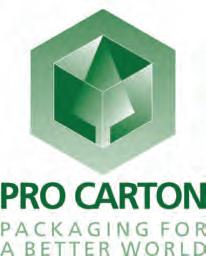



For over three decades, Gulfood has driven global food commerce — fueling innovation, collaboration, and the future of food. In 2025, it becomes the epicentre of a transforming food landscape. Be where the next era of food begins.
Gorreri Food Processing Technology is an Italian producer of turn-key lines and tailored machinery for the industrial and semi-industrial production of various types of cakes. Gorreri supplies a complete range of cake processing technology, designed in accordance with customers’ production needs and applying more than 55 years of experience.
The company. Founded by Mr. Luigi Gorreri, President, the Company is led by the Gorreri family and part of Middleby Bakery, which collaborate directly with customers on all types of new projects, turning product ideas into efficient lines and suggesting processing solutions drawn on years of global production. Gorreri offers crucial expertise for solving, avoiding, and preventing production issues.
The range. Gorreri produces a wide range of industrial machinery
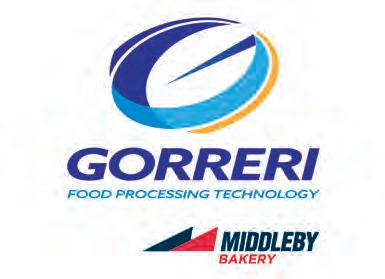
designed for top performance and efficient use of space, time, and cost, from mixing equipment to decoration and injection devices, continuing through ultrasonic cutting devices and robotic systems.
Along with premier performance, Gorreri machinery is manufactured to the highest hygienic standards to avoid product contamination and uniquely offering no-tools-maintenance and equipment that is sturdy enough to work 24 hours a day, 7 days a week, as required by industrial manufacturers.
Mixing equipment. To achieve final products of the highest quality you must start with the perfect batter and dough preparation. That’s why over the years, the Gorreri Team has developed and refined different mixing system concepts.
Turbomixer technology, The compact Gorreri Turboaerator is unmatched in continuous speed and superior final products. Refined over more than 30 years, TURBO-MIXER with VERTIMIX Technology mixes, emulsifies, and aerates creams, whipped cream, parfait, meringue,

and any kind of soft dough. The Turbomixer range has endless technical solutions, all developed to optimize customers’ production processes, merging the high and unique performance of Vertimix Technology with the advantages of continuous mixing, to grant uniformity, softness, and the compact structure of batters and creams, reducing thickening and emulsifying agents.
Thanks to the TURBOMIXER TECHNOLOGY, with its unique ability to whip egg whites to 180 gr/l, Gorreri has developed different systems to produce special products like chiffon cake, angel cake, ladyfingers, replicating handcrafted processes in industrial production.
Planetmixer is a range of vertical, pressurized planetary batch mixers, able to speed up the mixing and the preparation of any kind of hard dough, batter, and cream, available in six different capabilities (from 120 up to 800 liters) to satisfy any production request.
Each PLANETMIXER is fully customizable and can be equipped with a full range of options like warm- ing and

cooling systems, steam, automatic charging and discharging of ingredients, vacuum, etc.
New gorreri innovation. Cuttermixer scraps retriever. In addition to the Turbomixer and Planetmixer, Gorreri has designed a new and innovative mixing equipment, developed to chop, rehydrate, and melt cakes and sponge cake production scraps.
Cuttermixer allows the sustainable recovery and reuse of 100% of production scraps, helping companies save costs, labor, and energy.
Tailor made industrial lines. GORRERI designs and manufactures different solutions for the industrial and semi-industrial production of all types of cakes.
Originally known as a consulting company for sponge cake industrial pro-




cessing lines, Gorreri has mastered the entire process from batter preparation to decoration.
With years of dedication, Gorreri developed complete and skilled proficiency in the processing of any kind of cake cupcakes, muffins, dosed soft battered cakes, shaped dosed cakes, multi-color dose cakes, birthday cakes, slab cakes, sponge cake based products and sponge cake semi-finished products, lady fingers, individual desserts, tiramisù, cheesecakes, macarons, meringue, pies, and tarts.
Leader in fresh and frozen birthday cakes lines. One of the fields where Gorreri has developed a matchless expertise in the last 15 years is the industrial process of
ogy creates cakes both with and without the need of rings or moulds. Just a few operators can oversee the customized 1500 cakes/hour automatic processing line. Pick and place cake disks, dosing systems designed according to cream structure, jam and viscous products dosing devices, masking devices which can mask two cakes in less than 3 secs, lateral and top graining systems for nuts, sprinkles, grain, powders, flakes and chocolate chips, top decorations such as rosettes and twisted dallops and robotic systems to write or replicate any kind of image are applied according to recipe.
In addition to fully automatic lines, GORRERI has developed one of the smartest semi-automatic processing solutions, able to produce up to 120 cakes/hour. MULTIMATIC 300 allows standard and expedited production with just one operator but can also be used for many other applications by simply changing tools
for dosing cakes, filling products, and enrobing cakes. All done in a reduced space and on wheels. Gorreri’s goal is to optimize customers’ production. Gorreri Birthday Cakes Lines allow producers to improve quality, standardize final products, improve production and dramatically reduce the number of operators especially if integrated with TURBOMIXER Technology for the preparation of creams and whipped cream.



Muffins and dosed products lines. Industrial and semi-industrial lines for the production of any kind of dosed product, shaped, dual color, enrobed, decorated, filled, and grained.
Gorreri dosed product lines are all powered by Dosatronic Technology, an electronic dosing concept to grant extreme precision and uniformity of each dosage, both for dosing, injecting, and decorating. It grants endless repeatability of the process cycles even with the stickiest and the most viscous products. Each muffin and dosed product line is reviewed to ensure precision and ease of use, ensuring the highest standards for hygienic design.
Tiramisù and individual desserts lines.
High precision Gorreri Dosatronic Technology integrated with the Turbomixer to continuously feed hoppers with perfect machinable creams. Initiated by customer need, Gorreri has recently introduced complete and fully automatic individual dessert lines which are completely customizable and able to produce product with plastic cup depanner, pick and place devices for biscuits and sponge cake
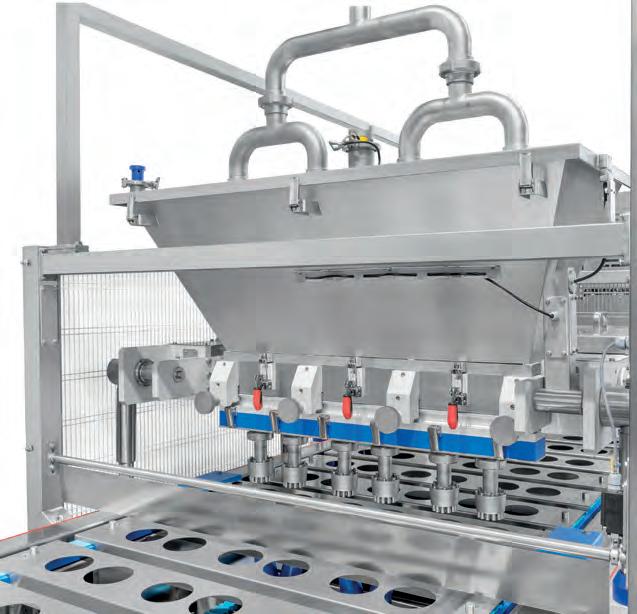

disks, decoration stations to apply jam, icing, chocolate, grains, and powders for top décor, and automatic lid depanning
www.gorreri.com
Middleby Bakery provides advanced innovative and custom solutions for high and small volume producers, covering processes from raw material preparation to product packaging for retail and food service applications. For more information visit middprocessing.com



The Emilos sieving system is patented and delivers outstanding performance in terms of productivity and quality. Emilos’ dynamic approach ensures direct and immediate alignment with customer needs.
To address any challenges, the company conducts specific screening tests and manufactures vibrating screens that are exclusively Made in Italy.
Emilos designs and produces vibrating screens suitable for sieving both food and non-food products, offering both in series and customized solutions.
Designed for continuous 24/7 operation, Emilos vibrating screens stand out from traditional models on the market due to their unique construction concept and the vibrator motor they are equipped with. Operating at 3,000 rpm instead of the stand-

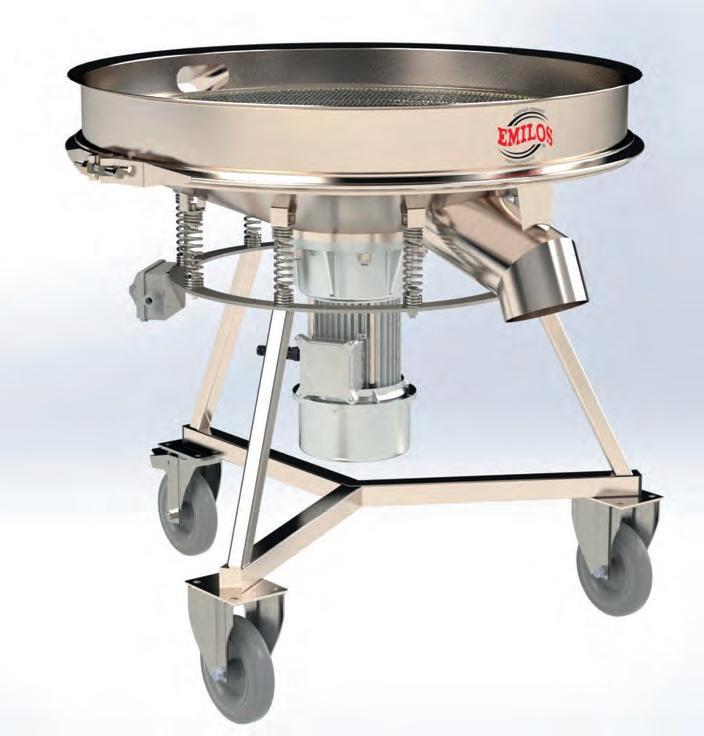

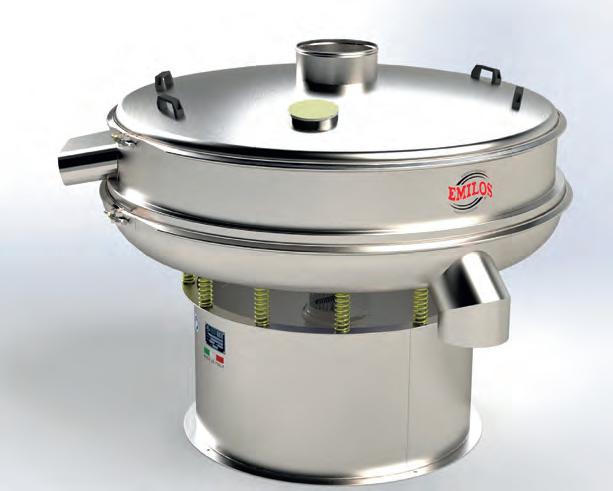

ard 1,400 rpm, and allows for high hourly production.
For screening particularly challenging products, Emilos equips its vibrating screens with systems to prevent mesh clogging, thus increasing production and reducing downtime caused by interruptions for cleaning clogged meshes.
These systems include brushes, perforated trays with rubber balls or anti-clogging rings, and mesh frames featuring spokes and a small timed pneumatic motor.
The Emilos double-groove mesh frame allows operators to replace the mesh quickly and independently, reducing labor and transportation costs as well as downtime for technical assistance from the manufacturer.
Emilos vibrating screens are entirely constructed from stainless steel AISI 304L (or AISI 316 upon request) and can be equipped with Emilos-branded motors certified for explosive environments (Atex II 2GD EEx d IIB T4 certification).
The screens can handle any type of mesh, from the finest (e.g., 0.035 mm mesh size) to the largest, and are characterized by minimal maintenance requirements.
Emilos’ product range includes circular vibrating screens with diameters ranging from a minimum of 450 mm to a maximum of 1,800 mm.
Additionally, the company produces rectangular screens for high hourly throughput or with side-mounted motors instead of the traditional bottom-mounted ones, coarse sieves, refining vibrating screens, as well as automatic and manual magnets.
In the competitive world of food manufacturing, precision, quality, and efficiency are paramount. The weighing process of micro-ingredients, which form the backbone of many food recipes, needs to guarantee precision, quality, repeatability, and traceability. This is where Lawer’s automatic weighing systems come into play, offering a multitude of advantages and benefits to food manufacturers.
One of the primary advantages of Lawer’s systems is the unparalleled precision of weighing they offer. They ensure the exact measurement of micro-ingredients, maintaining the highest quality of the finished product. This precision is crucial in the food industry, where even slight deviations can affect the texture, flavor, and safety of the product. Lawer’s systems offer different levels of accuracy, ranging from 1g to 0.01g, catering to diverse production needs.
By eliminating human error, these systems ensure that every batch produced is consistent in quality and taste. This consistency is vital for building consumer trust and brand reputation. The systems are designed to maintain the right balance of raw materials, ensuring that each product meets the same high standards, and granting the perfect repeatability of the recipes.
Efficiency is another significant benefit of Lawer’s systems: they streamline the production process, reducing the time required for weighing micro-ingredients with high

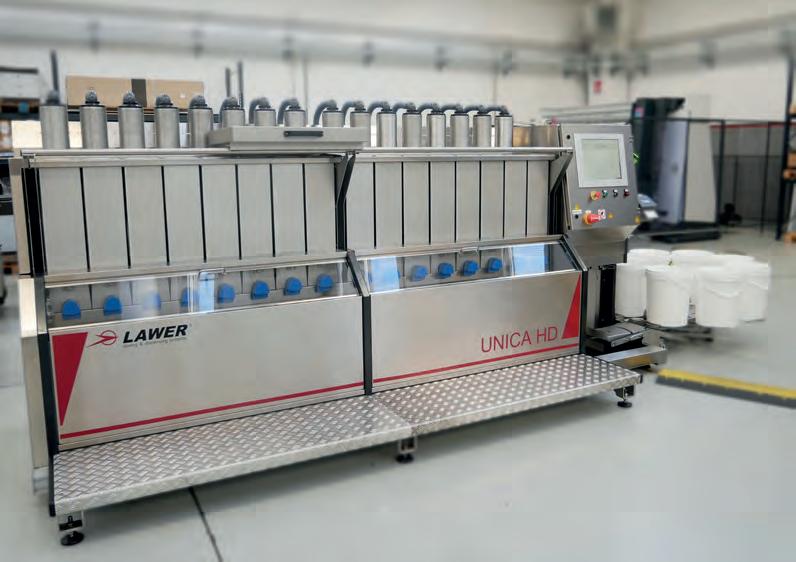
precision. This optimization leads to higher productivity and lower operational costs. Lawer’s systems, such as SUPERSINCRO and UNICA, are designed to cater to both largescale and small-medium productions, offering solutions that fit various production scales and needs.
Traceability is a critical aspect of the food industry, ensuring that every step of the production process can be tracked and verified. Both SUPERSINCRO and UNICA systems are equipped with advanced control software that guarantees effective cross-checks and traceability This software generates sophisticated reports and allows seamless integration with external systems (MES), aligning with Industry 4.0 standards. Additionally, these systems maintain perfect hygiene and safety in handling, using stainless steel silos and efficient suction-filtering devices to ensure a clean working environment.
Maintaining confidentiality of proprietary recipes and processes is essential for food manufacturers. SUPERSINCRO and UNICA can safeguard this confidential information, ensuring that know-how remains protected. This protection is crucial for maintaining a competitive edge in the market.
Flexibility is a standout feature of automatic weighing systems. They can be customized to meet specific production requirements, whether it’s storing products in fixed and interchangeable silos, hoppers, or big bags. Systems like SUPERSINCRO offer customizable solutions for various products and production scales, enhancing the versatility and adaptability of the manufacturing process.
SUPERSINCRO
•Totally customizable
•Modular system
• Silos (fixed and interchangeable), hoppers, big bags for the storage of products (from 380 to 1800 l)
• Automatic generation of bags of variable size (from 9 to 36 l)
•One bag with a recipe every 30 seconds
•Loading of the products by gravity or vacuum
•Double dosing screw and anti-clogging devices
•Efficient suction-filtering device
•Control software integrated with external systems
• Ideal for large productions
UNICA TWIN
• 12, 24 or 36 stainless-steel silos, capacity 100 l
•One or two scales, with a precision of 0,1 g
•Loading of the products by gravity or vacuum
•Dosing screw (Lawer patented) and anti-clogging devices
• Efficient suction-filtering device
•Control software integrated with external systems
• Ideal for small-medium productions
UNICA HD
•8-16 or 24 silos, capacity 50 l
•Stainless-steel screws
• One electronic scale, capacity 30kg and resolution 1g
•Loading of the products by gravity
•Control software integrated with external systems
• Ideal for small-medium productions
Advanced technology and innovation
Lawer, an Italian company founded in 1970, has developed advanced technologies and know-how in the automatic weighing of powder and liquid products. Their expertise in single- or multi-weighing systems has made them a trusted partner in the food industry
Continuous investments in safety and improvement of the working environment further enhance the reliability and efficiency of their systems.In conclusion, the benefits and advantages of automatic weighing systems are manifold. From precision and quality to efficiency and traceability, these systems revolutionize the food manufacturing process, ensuring consistent, high-quality products while optimizing production and reducing costs. As the food industry continues to evolve, the integration of advanced automatic weighing systems will only become more critical in maintaining competitive advantage and meeting consumer demands.
www.lawer.com

Raytec Vision, a leading provider of optical sorting solutions, proudly announces the launch of Opportunity, an innovative optical sorter that harnesses the power of artificial intelligence (AI) to revolutionize food sorting. Designed to meet the highest standards of accuracy and quality, Opportunity is
set to transform the food processing industry.
Opportunity combines advanced imaging technology with state-of-the-art AI algorithms, enabling it to analyze and sort food products with unprecedented precision. Its intelligent system learns and adapts to various sorting
requirements, ensuring consistent and reliable results. With this revolutionary technology, food producers can achieve optimal product quality, reduce waste, and enhance overall operational efficiency.
“At Raytec Vision, we are committed to pushing the boundaries of opti-

cal sorting technology,” said Nicola Avanzini, Head of Sales at Raytec Vision. “Opportunity represents a significant breakthrough, as it leverages AI to deliver unmatched results, setting new standards for the food processing industry.”
The AI-driven capabilities of Opportunity enable it to identify and eliminate defects, foreign objects, and contaminants in real-time. By swiftly and accurately removing imperfections, companies can en-hance product quality and safety, thereby protecting their brand reputation and ensuring consumer satisfaction.
In addition to its precision sorting capabilities, Opportunity also offers a user-friendly interface, making easy for operators to monitor and manage the sorting process. Its intuitive
controls, coupled with real-time data visualization, allow for efficient decision-making and quick adjustments, resulting in increased productivity.
“With Opportunity, we aim to empower food processors to deliver the highest quality products to their customers,” added Nicola. “By leveraging AI and cutting-edge technology, we are re-defining what is possible in food sorting, while simultaneously improving efficiency and reducing costs.”
Raytec Vision continues to innovate and develop advanced solutions that address the evolving needs of the food processing industry. With Opportunity, food industries can embrace the future of optical sorting and achieve the utmost precision, quality, and efficiency in their operations.
For more information about Raytec Vision and their AI-driven optical sorter, Opportunity, please visit.
www.raytecvision.com/en/

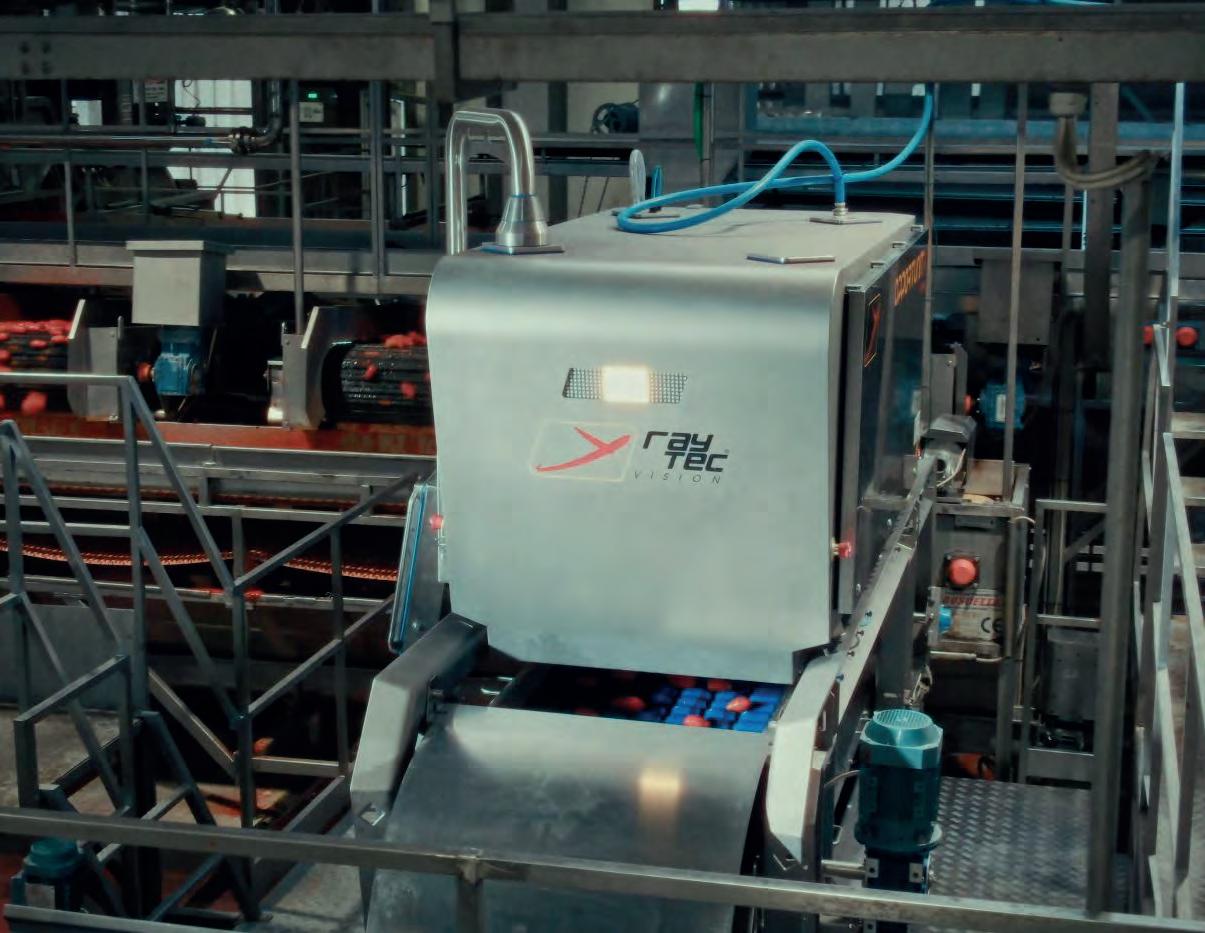
We at ORION ENGINEERING develop “tailor-made” solutions to completely transform an extremely widespread fruit with an increasingly growing market trend: the coconut. Today, we are pleased to explore with you the main stages of obtaining one of its derivative products: natural coconut water.
Coconut water, also called coconut juice (not to be confused with coconut milk), is a sweet refreshing drink taken directly from the inner part of coconut fruits. It differs from coconut milk, which is the oily white liquid extracted from the grated fresh kernel. The coconut water consumed as a beverage usually comes from immature coconut fruits.
Coconut water has traditionally been consumed as a refreshing beverage in most coconut countries. Growing consumer interest in the product both as refreshing beverage and as a sports drink has considerably broadened its market opportunities.
Coconut water within the nut is sterile. This means that it is free from microorganisms. Whenever exposed to the air, or to the external environment, the product is subject to microbiological contamination and deterioration.
Proper handling and temperature management throughout the postharvest and processing chain are essential to allowing coconut water to retain its inherent qualities prior to processing.
Proper sanitation management throughout the chain is also critical to assuring the quality, safety, and shelflife of the bottled product.

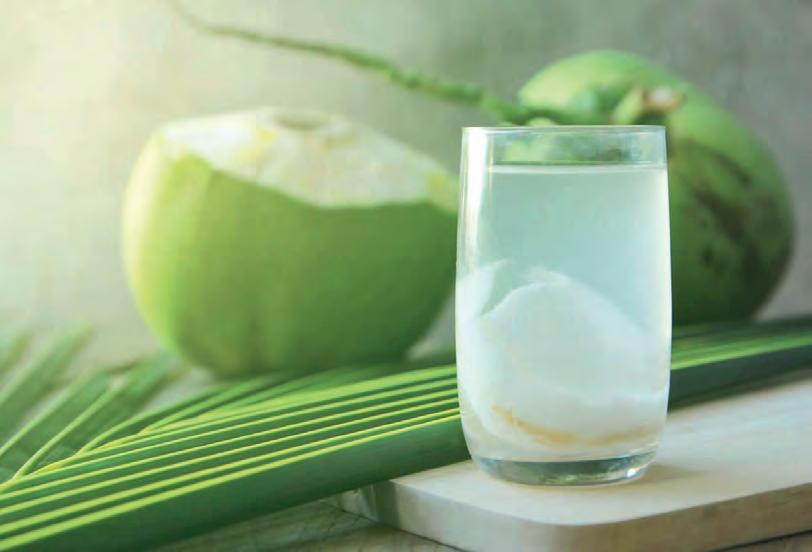
The coconut water is collected through a drilling extraction process with the water immediately entering a filtration system and then quickly transferred to material receiving storage tanks.
Next, the coconut water is pumped from the material storage tanks into cooling system at 40°C and then through an oil separator to extract the highest quality pure coconut-based water product. Once the purification process is complete, the coconut wa-
ter is then piped to an insulated industrial storage tank.
The coconut water can be enriched with the best fresh fruit extracts to obtain a flavoured drink: for this purpose, the natural water is sent to a blending process just before being piped into insulated industrial storage tanks.
The final stages of coconut water production involve a cooling process at
the temperature of 8°C - 100°C. in preparation for an integrated UHT pasteurization process. The water is then filled into an aseptic tank that supports an aseptic filling process performed under strict aseptic processing requirements.
Once the product has been filled into aseptic containers, there is an automated packaging process that is equipped with preset parameters and standardized, so that it will only operate when all safety conditions are complying.
Another alternative to natural coconut water can be tender coconut water or concentrated water.
The tender coconut water is valued both for the refreshing drink and ge-
latinous kernel, which is a delicious food. The tender nut water is rich in potassium and minerals. Glucose content is maximum in 29 – 31 weeks months of maturation nuts and hence the best stage for drinking. The dwarf coconut variety, Chowghat Orange Dwarf (COD) is a tender nut variety. The tender coconut water concentrate was prepared using fresh coconut water collected under hygienic condition.
Suspended solids and oil in the samples were removed by means of three-way centrifuge. The removal of the solids and oil was necessary to minimize fouling of the membranes. The salts present in coconut water may be removed if desired, prior to concentration, to produce a very sweet product.
This is achievable by passing the centrifuged coconut water through a mixed-bed ion exchange resin. The concentrate can be frozen or preserved in cans and used as base to produce carbonated and non-carbonated coconut beverage.
The multidisciplinary technical staff of ORION ENGINEERING has been carrying out R&D for some time to maximize the type of products and by-products obtainable from coconut. At the same time, it pursues the objective of reducing the processing waste generated to minimize their impact on the environment. We will develop for you the best solution tailored to your objectives and needs.
Visit:
www.orion-eng.it


Anew player has emerged in the dynamic landscape of the dairy sector that is set to redefine the industry’s prospects: Milkita Group.
Milkita Group aims to become a “Made in Italy” reference point in the world of Dairy products.
Three historical companies, Pietribiasi Michelangelo, Frautech Separators
and MilkyLAB, capable of covering all processing operations.
Milkita is a true benchmark, offering a wide range of innovative and integrated solutions for milk and beverage processing.
Milkita’s vision is clear and ambitious: to become a point of reference in the dairy industry, bringing together expertise, technology and experience to provide customers with the most comprehensive range of milk processing
machinery. And not only that. The aim is to follow the path of milk from the moment it enters the plant to the production of finished products, including cheese, dairy products, and yoghurt. However, Milkita’s ambition does not stop there: the group also aspires to be a reference point for the fruit juice, ice cream, beer and wine sectors, paving the way for new synergies and opportunities.
Milkita’s value proposition translates

into complete plants and all-round service.
Customers have the option of relying on a single partner for the construction of their production plants or raw material processing lines.
This simplifies the decision-making process and enables customers to focus on their core business, knowing that they can count on a reliable and experienced partner.
Milkita aims to combine the best of Italian industrial traditions, technological expertise and quality with experience and passion, offering integrated machinery and complete treatment solutions.
Pietribiasi Michelangelo produces machines and complete lines for the dairy industry (milk and cheese, butter, yoghurt and fermented products, ice cream and cream), and for the production of fruit juices and soft drinks, ice cream and beer.
•UHT and pasteurisation plants
•plate and tubular heat exchangers
• CIP washing plants
• milk receiving and refrigeration units
•reconstitution mixing plants
•complete dairies
www.pietribiasi.it
Frautech
The FRAUTECH brand is present in the milk and beverage industry with over 100 years of experience and is synonymous with long experience in the design and production of centrifugal separators.
• The full range of separators includes clarifiers, bacteria removing clarifiers, milk and whey skimmers and automatic milk standardisation systems.
• Our self-cleaning, solid bowl separators cater for a range of flow rates from 1,000 to 60,000l/h. Over 5,000 process separators are installed worldwide with customised solutions.
frautechseparators.com
has been a leader in the design and production of machines and automatic plants for the production of Pasta Filata Cheese (Mozzarella, Pizza cheese, String cheese , Analogue Mozzarella, Spread cheese) and Ricotta since 1980.
MilkyLAB’s objective has always been to export the Italian mozzarella tradition worldwide.
Once MilkyLAB has installed the equipment at the customers’ premises, training and assistance is provided to ensure that best production performance.
www.milkylab.it

Color Service is an Italian excellence and since 1987 has positioned itself as a leading supplier of automatic dosing systems for any kind of powder and liquid product.
With a start in the textile field and thanks to years of experience and know-how, Color Service introduced its unique technology into many markets segments (rubber, tire, cosmetics, plastics) before orienting his innovation into the food industry, where the dosing of powders and liquids requires considerable precision, speed and traceability.
Weighing is a key element of the food production process for quality compliance: dosing the proper amount of ingredients is extremely important to fulfill recipe specifications and constant quality requirements. In most cases, the food industry’s
weighing department employs operators who manually dose raw ingredients, resulting in difficult and complicated management in terms of weighing accuracy.
To support this necessity, our technology is designed to solve problems associated with the manual weighing of any kind of powders and liquids applied in the food industry and it is developed with the goal of achieving a safe, fast and precise dosing. The aim is therefore the development of high-efficiency systems that allow to minimize the production costs and boost productivity while also improving final product quality, essential for the competition of all companies.
According to customer’s requirements, Color Sevice offers to the market two


solutions of automation: a complete full automatic and a semi automatic weighing system.
With the full automatic dosing system, all processes are automatically monitored and data are recorded in the software integrated with the customer’s management system. The activity of the operator is exclusively confined in the loading of products into storage silos of various capacities through high-performance vacu-
um for powders and pump for liquids that guarantee fast loading with low air consumption.
During the dosing, a multi-scale conveyor completely aspirated through a dedicated dust extraction system allows high dosing accuracy of recipes that can be dosed directly into a bucket or in identified bags created in a completely automatic way: this is a fundamental characteristic that allows each individual recipe to be traced. The full automatic system, guarantees High Dosing Accuracy,
Batch Traceability and Modularity of storage stations and according to product consumption and production requirements, the system offers several storage modules of different capacities that could be interchangeable or expanded in the future.
On the other hand, the semi-automatic weighing system can offer a good compromise: the robotic storage of powder products with the manual

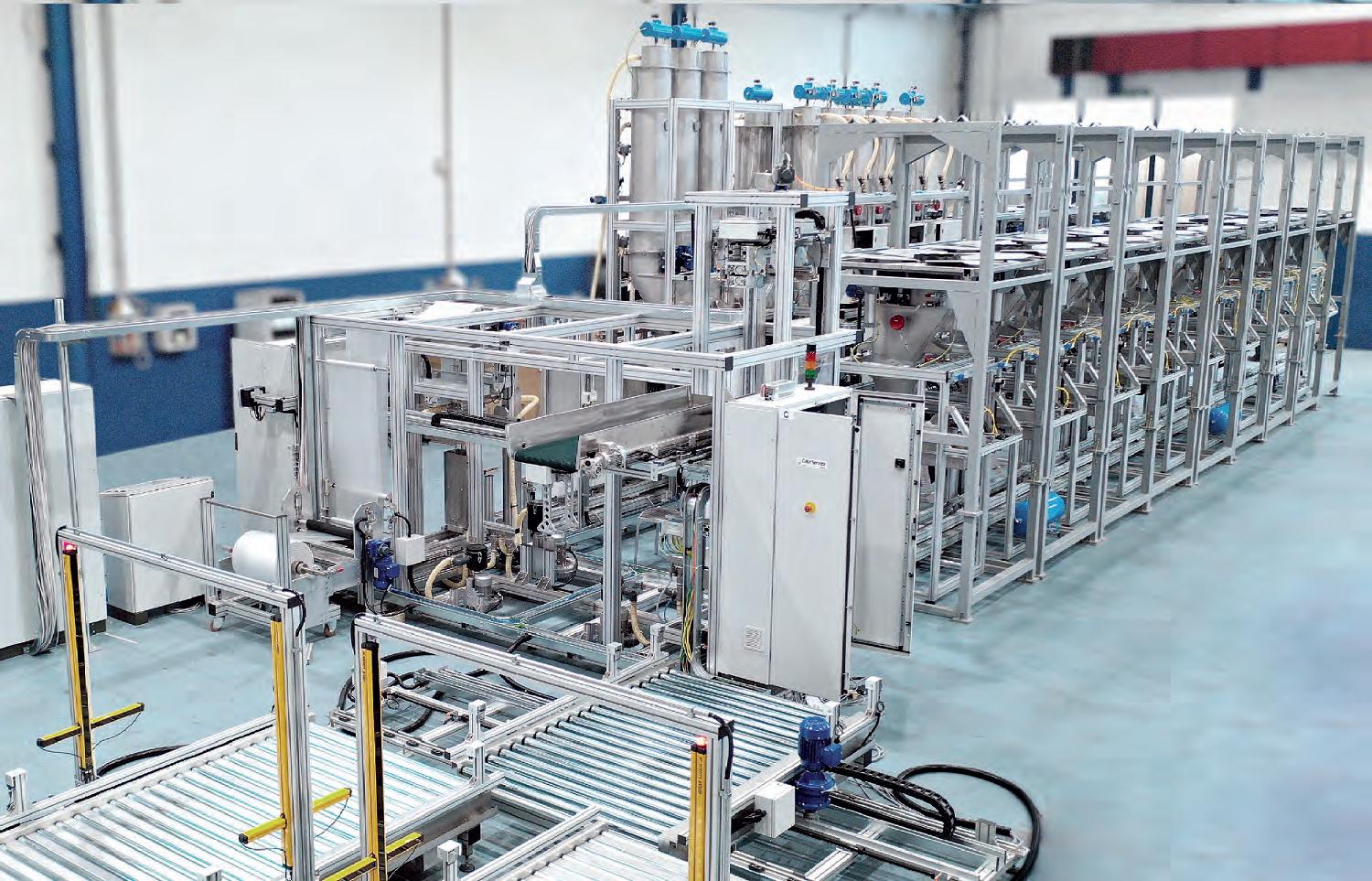
weighing assisted by a PC. In this way, according to the recipe, the system drops the right box and transfer it to the weighing position, where the operator, guided by the PC can dose the product.
By investing in an automatic dosing system, the customer will be able to benefit from a repeatable production process that runs 24 hours a day, is reliable and fast, in which human error is definitively eliminated and which allows leading to high-quality
end products with uniformity features throughout time. Systems are user-friendly and software is intuitive and easy to use, allowing a quick and easy understanding.
„Dosing right the first time” as a consequence of accurate and exact dosing of powders and liquids, results in a reduction of product waste, energy/water consumption, processing times and, as a consequence, cost.
From the ecological point of view, our technology reduces to zero the exposure for operators to dangerous substances or toxic ingredients and provides absolute control of the dust

emitted during the weighing with the use of special suction devices, ensuring total operator safety and environmental protection.
Another significant advantage is the traceability of recipes. Indeed with a manual weighing, in case of non-conformity, it is impossible to identify all the products that are affected by this problem downstream and it is difficult to trace the causes upstream that can be represented for example by an incorrect mixing proportion or from a non-conformity of a specific ingredient. Without expensive labor costs due to manual batch processing and profit loss due to recipe formulation mistakes, companies can begin to boost profits, while offering a superior and uniform product to their customers.
www.colorservice.eu

“
The use of robotics and artificial intelligence in packaging is increasing, providing benefits in efficiency, quality,and sustainability. However, companies must consider costs and invest in training for effective use

The world of packaging is undergoing a rapid evolution thanks to the introduction of robotics and artificial intelligence. In recent years, advanced technologies have radically changed the way companies produce and package their products, offering advantages in terms of efficiency, precision, and sustainability.
One of the main benefits of using robots in packaging is the increase in speed and efficiency. Robots can work 24/7 without interruptions or slowdowns, improving productivity and reducing delivery times. Additionally, robots can be programmed to work precisely

by the editorial staff

and repetitively, reducing human errors and improving product quality.
Artificial intelligence is another technology that is revolutionizing the world of packaging. Thanks to AI, machines can continuously learn from their environment, improving their performance and adapting to new situations. For example, machines can use artificial vision algorithms to detect defects or anomalies in products, reducing the risk of errors and improving product quality.
Another advantage of using robotics and artificial intelligence in packaging is the reduction of waste and environmental impact.
Machines can work with greater precision and use only the amount of material necessary to package products, reducing waste and energy consumption. Additional-
ly, machines can be programmed to recycle or reuse packaging materials, reducing environmental impact.
However, the introduction of robotics and artificial intelligence in the world of packaging is not without challenges. For example, companies must invest in expensive technologies and train personnel to use them effectively. Additionally, machines can be subject to malfunctions or breakdowns, causing interruptions in production and additional costs for maintenance.
In conclusion, the world of packaging is becoming increasingly robotic and intelligent, offering numerous advantages for companies that decide to invest in these technologies. However, it is important to carefully evaluate the costs and benefits before making a decision and ensure that personnel are adequately trained to use the machines effectively.

Founded in 1965 in the middle of the Motor Valley, Mini Motor is a leading company with a long history of innovation and passion for mechatronics and industrial automation.
Today it is present in more than 50 countries, but its heart always beats for technological excellence and customer satisfaction.
Thanks to the continuous evolution and integration of mechanics and electronics, Mini Motor is able to respond with tailored solutions to the specific needs of sectors such as Food & Beverage, embracing the challenges of Industry 5.0 and offering cutting-edge technologies.
Bringing value and technology to the food industry
Industry 4.0 has marked a momentous turning point in the technological revolution, and Mini Motor has been at the forefront of it.


Now, with the advent of Industry 5.0, the future becomes even more fascinating: it is one in which solutions become not only smarter, but also closer to people, more flexible and sustainable.
Mini Motor is also leading the way in this context, and its Clean Line is the perfect demonstration of this. This line puts what really matters first as it is designed specifically for the food sector and combines advanced technology, hygiene, reliability and safety, indispensable allies for food processing.
Mini Motor’s SS (Stainless Steel) models are made of stainless steel, a material that is resistant to corrosion caused by food and beverages, pre-
venting contamination and alteration of the latter: it is precisely this characteristic that makes them the protagonists of the line dedicated to the Food & Beverage sector.
The use of AISI 304 stainless steel (or the optional AISI 316L) is a mandatory and successful choice in the food industry, as these alloys offer optimal characteristics compared to other materials: extreme resistance to boiling water jets (80°C) and high pressure (90 bar; absence of protective coatings, which, if chipped or worn, can cause discontinuities on the surface; porosity-free surface compactness, ideal for hygienic surface cleaning; high bacterial removal in cleaning cycles; and low postcleaning bacterial concentration, which should remain unchanged for as long as possible. Due to the peculiarities of the material, models in the SS Mini Motor line can be easily sanitized, ensuring compliance with ISO 9001:2015 standards.
The design conforms to E.H.E.D.G. (European Hygienic Engineering & Design Group) guidelines, ensuring compliance with the stringent requirements of hygiene-oriented industries.
Finally, IP67 and IP69K ratings ensure high resistance to dust, liquids and high pressures, offering maximum safety and cleanliness.
The high level of technology that characterizes Mini Motor motors has always made them cutting-edge, and today it also places them as pioneers of Industry 5.0, perfectly integrated in the logic of personalization, enhancement of the human-machine relationship and sustainability. In this context, Mini Motor motors become undisputed protagonists of

the future in the Food & Beverage sector, thanks also to the possibility of being combined with the DRF, the new IP67-certified integrated inverter.
Mini Motor’s DRF offers an innovative solution to one of the main needs of food companies that are part of Industry 5.0, namely the demand for flexible and easy-to-use machinery.
The speed of the electric motor can be conveniently programmed and changed from the PC or wirelessly.
In addition, direct mounting on the motor reduces wiring costs by up
to 50 percent compared to traditional solutions. Thanks to the DRF, connectivity remains the company’s flagship, allowing connection with the most common field buses, first the analog ones (Canopen and Modbus), then the more advanced Ethernet buses (Profinet, Ethercat, Powerlink and Ethernet IP).
In concrete terms, Mini Motor proves to be the ideal partner for Food & Beverage companies that want to be key players in the future of their business.
Discover more on: www.minimotor.com
Mr.Gabriele Macchi, Operations Director at PROXAUT, tells us how the new automated guided vehicle was born: the CUBE. Thanks to the skills acquired in the field of R&D, Mr. Macchi has become a promoter of technological innovation and supporter of new employment policies.
Listening to the market demands of this last year and after having carried out a dedicated strategic marketing study, together with the Management of PROXAUT, Mr. Macchi and his team of researchers have taken care of developing a new AGV vehicle.
“The challenge was to find a SMART solution, designing and building a small and versatile AGV, capable of carrying weights up to 1000 kg (2200 Lbs). PROXAUT vehicles, in fact, are built to work in narrow spaces, such as in warehouses where we have a few centimetres of tolerance for our automatic handling.
We have therefore used years of experience to create a small self-driving shuttle (1300 x 900 x 300 mm h) with inertial guidance capable of passing where others do not enter. There are no application and industry limitations for this automated transportation system. Do you have a Euro pallet with

Gabriele Macchi Operations Director at PROXAUT


goods weighing 1000 kg to be transported from point A to point B? Here’s the solution: CUBE by PROXAUT!
An efficient automated warehouse worker which will work for you 24/7, without going on vacation or getting sick. “I don’t deny that a minimum maintenance must be done regularly, but this operation takes only a few hours a year and serves to ensure optimal performance and maintain maximum efficiency levels, also in terms of the durability of lithium batteries” Mr. Macchi tells us. “Moreover, the advantages of these forklifts with and without forks are now known: reduction of personnel and indirect costs in general, reduction of human error thanks to integration with WMS and management software, improvement of traceability and management of warehouse stocks, maximum configurability with company management
systems, increase in production with 24/7 shifts, improvement of safety, optimization of flows and traffic, operation in environmental conditions hostile to man, hygiene and cleanliness”.
But we are curious... We want more... What about the price? The Operations Director smiles and replies without hesitation: “I’m a technician, not a salesman. However, I can tell you that we have tried to make a lowcost shuttle. If we don’t consider the prototype presented at the fair MECSPE (6-8 March 2024 in Bologna) and LogiMAT (19-21 March 2024 in Stuttgart), we have already put a series of vehicles into production. The trade fairs have given us the desired results, we have already concluded some sales contracts for AGV plants, including of course also several CUBEs that should be operational at the end of summer 2024. We
have already had confirmation from our Production Manager that, compared to the prototype, prices have dropped: the industrialization of this model allows us to enter the market with a very interesting and competitive price!”
The challenge of a market in constant revolution does not scare Proxaut.
The trade fairs of recent months and a growing market have given new life to a company that has been on the market for over 30 years. From a small family-run business, it has become part of an international group, the Middleby Corporation, a world leader in the food machinery industry. In 2022, the year Proxaut was acquired, it was named “World’s Best Employer” by Forbes magazine.
For more information: www.proxaut.com www.middleby.com
In the world of the food industry, product safety is of paramount importance. The challenge of keeping food safe and of high quality throughout the entire production and distribution process is complex but essential.
For over 50 years, ifm has been committed to providing integrated automation solutions for the food sector.
The company offers products and services aimed at ensuring transparent processes in food processing, packaging, and cold chain management, thus guaranteeing food safety “from field to table.” Specifically in this field, ifm can play a leading role because it has all the necessary automation and process digitaliza-

tion technologies to support safe production, and because its expertise is demonstrated by its membership in EHEDG (European Hygienic Engineering & Design Group)—a European consortium that includes food companies, equipment manufacturers, research institutes, and public health authorities.
Today, ifm expands its already extensive range for this sector with the
brand-new SM Foodmag, a magneto-inductive sensor that meets the highest standards of the food industry by bringing hygienic measurement of liquid food flows to a new level.
Equipped with IO-Link, the sensor requires no mechanical components in contact with the fluid and simplifies direct transmission of digital data, effectively eliminating the last blind spot in the production process and

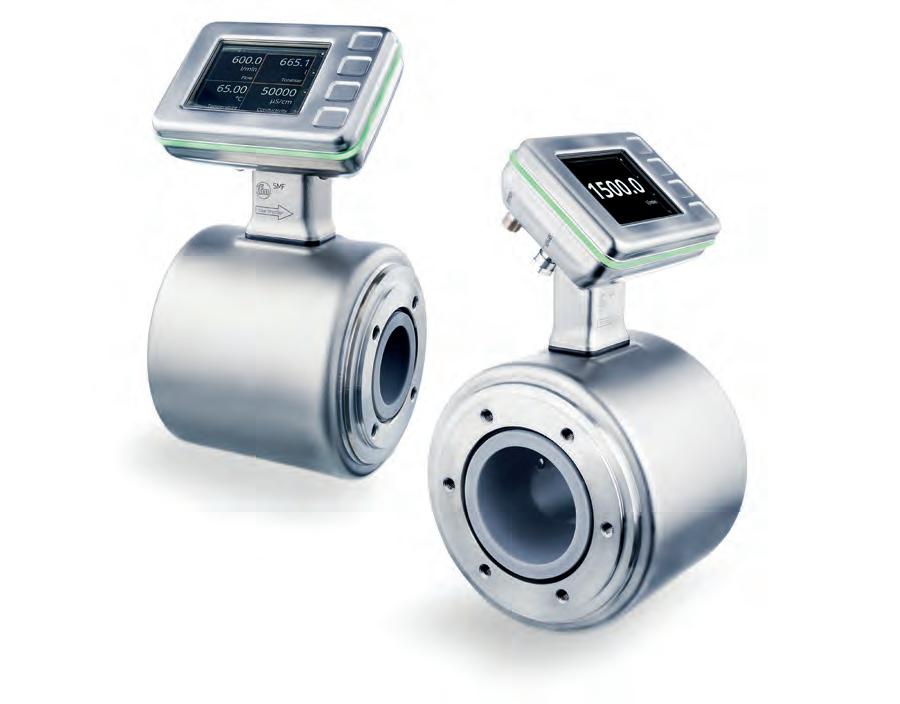
thus providing complete transparency.
Highly functional (it is also available with a display and 360-degree status LEDs for precise and timely information), SM Foodmag by ifm detects in real time the presence of fluid, its flow rate, total volume, and direction.
It also transmits data regarding the liquid’s conductivity and temperature to the control system and IT level. As a result, it offers the advantage of “measuring what matters” with a single device, reducing the need for additional measurement points in the system.
Integrating SM Foodmag with existing systems is extremely straightforward. Its standard M12 connector, combined with a flexible choice of seals and process adapters, ensures a quick, hygienic, and errorfree connection to the infrastructure. The app-based menu structure and optional guided installation make
parameter setting an extremely intuitive task.
testing ensures lasting quality
Through meticulous internal and external tests, SM Foodmag is guaranteed from the outset to withstand the extreme conditions typical of daily production in the food industry.
The thermal shock test evaluates the sensor’s accuracy under significant temperature changes, such as those occurring during pasteurization.
In this process, milk or highly acidic products are heated to temperatures between 72 °C and 95 °C and then rapidly cooled to ensure their preservation. Even after one thousand hours of continuous stress caused by sudden temperature changes from below zero to above zero, the measurements must remain within predefined accuracy limits.
To transfer fluids from tanks to subsequent processing phases, pumps
and valves are used. Pumps generate constant vibrations, while valves undergo rapid openings that cause pressure spikes.
The pressure spike test replicates these surges by intentionally applying pressures that exceed the nominal values indicated in the technical documentation.
After one million cycles, the Foodmag SM undergoes a strict seal test. Additionally, shocks and vibrations along the X, Y, and Z axes are intensely simulated over several days to ensure that external influences do not compromise the device’s performance.
In the condensation test, cold fluid flows through the piping system and the sensor in a warm environment. The Foodmag SM is exposed to high humidity and condensation for weeks and in various installation positions, confirming that moisture does not penetrate inside the device.
www.ifm.com/it

In the late 1800’s and early 1900’s, the invention of the double seam – a means of folding 5 layers of material in a way that interlocks a can end with a can body – transformed Food and Beverage packaging by eliminating the need for soldered seams to achieve a hermetic seal. By 1910, Henry L. Guenther had taken this advancement to the next level by designing and patenting the first machinery to create these double seams on cans. With that invention, the Angelus Sanitary Can Machine company was founded, with a vision of creating the finest machines of their kind, anywhere in the world.
Today, more than a century later, and with more than 16,000 seamers sold
in 132 countries across the globe, Henry’s vision has been realized, and the Angelus name is still recognized as the standard for excellence in seaming technology and equipment.
Joined with Pneumatic Scale Corporation in 2007, the combined company of Pneumatic Scale Angelus is a global leader in the design and manufacture of packaging machinery for liquid and dry filling, capping, can seaming, and labelling applications as well as state-of-the-art container handling solutions. The company is a division of BW Packaging under the Barry-Wehmiller umbrella of companies.
In recent years, the company has introduced the Angelus V-Series line, designed to meet the specific needs of
the Food and Beverage markets. The same technology used for high-speed seaming applications has also been scaled for the needs of the craft beverage space. Angelus has manufacturing facilities in Ohio in the United States, as well as its Parma, Italy location.
In nearly all markets Angelus serves, concerns for sustainability and increased, pandemic-driven demand for shelf-stable products created a surge in can demand and a subsequent shortage of them. Though pressures have eased somewhat, with can makers working aggressively to increase production, it will still take time for supply to catch up with demand.
In addition, the lightweighting of cans brings challenges to seaming

equipment, as lighter cans can often lead to an increased risk for can damage during production and even transportation. Seamer suppliers like Angelus are responding with innovations to seamer design and container handling.
For Pneumatic Scale Angelus, consistent communication with can makers helps drive not only future product design, but also current partnerships with customers to analyze produc-
tion and mitigate potential areas for damage, not only at the seamer, but also upstream and downstream from the seaming process. Angelus currently has patents pending for several new developments in seamer design and container handling that it believes will provide superior solutions for its customers, as well as a competitive advantage for the company.
When asked about the future of sea-
mers for Food and Non-Food cans, Thomas Thiel, Product Line Leader for Can Seaming replied, “Angelus continues serving the Food and Beverage markets with seamers specially designed to address their unique needs. We have a long history of innovation in seaming, and we are excited about our plans to continue that legacy well into the future.’’
www.psangelus.com
Fifty years after its debut in an Ohio supermarket, the barcode that identifies retail products is evolving into a new two-dimensional format, offering consumers with more information and enhancing efficiency for retailers.
On June 26, 1974, a supermarket cashier in Troy, Ohio, made history by scanning a barcode on a ten-pack of Wrigley’s Juicy Fruit chewing gum with a Magellan Model A scanner. Developed by Spectra Physics, now part of the Italian multinational Datalogic, this was the world’s first fixed retail scanner.
The ability to automatically identify products at checkout marked the beginning of a new era, revolutionizing the retail industry with unprecedented speed and accuracy.
Fifty years later, this innovation remains indispensable.
As a pioneer in identification technologies, Datalogic has recognized

Magellan 9600i/9900i scanners speed up code reading, identify products, and reduce theft
the vast potential of barcode from the start. Building on its early success with scanners like the Magellan Model A, the company has become a leader in the retail automatic identification

market. Datalogic has consistently remained at the cutting-edge of technological advancements to better serve its customers.
Beginning with the development of the first 1D scan readers, the company later led the way in using imager technology in scanners, and has recently elevated performance by integrating the latest AI-based technologies.
We are at a critical turning point as the retail industry gears up for the rollout of the GS1 Digital Link, a groundbreaking product identification code, which will gradually appear on all consumer product packaging by 2027, complementing the traditional linear barcode.
The GS1 Digital Link barcode is an upgraded version of the traditional barcode, embedding digital information accessible via a URL. This creates
a direct connection between a physical product and its associated digital content. The new GS1 standard QR code will enable consumers to instantly access up-to-date information about products they are considering purchasing by scanning the packaging.
This includes details of ingredient origins, allergens, usage (such as cooking tips and recipe suggestions), recycling or disposal guidelines, nutritional values, and much more. The code will also include detailed information about the specific package, such as the expiration date, production lot, or a unique serial number. This data can be integrated into retailers’ point-of- sale systems, improving security, streamlining procurement processes, and minimizing the risk of fraud.
Fabrizio Pareschi, Datalogic’s Global Account Manager, stated, “Consumers will be empowered to make more informed purchases by gaining insights into the environmental impact of the products they buy. They will have access to detailed information, such as the origin of a product and its ingredients, as well as guidance on how to recycle or reuse packaging. Retailers and supply chain companies can offer personalized content, promotions, or offers tailored to consumer preferences or location.
In addition, the new GS1 standard enhances traceability throughout the supply chain, aiding in the fight against counterfeiting and improving product recall management. It also optimizes inventory, warehouse management, and logistics processes by integrating with enterprise ERP and CRM systems. For these processes, Datalogic is the ideal technology partner, offering solutions for point-ofsale and data management through professional mobile computers like the new Memor 30/35. It is the perfect tool for tasks such as inventory management, price control, and stock re-
plenishment. All Datalogic retail products are already fully compatible with GS1 code management”.
The role of software, systems, and artificial intelligence
So, how is the retail industry gearing up for the introduction of these new two-dimensional codes? Michele Benedetti, Chief Technology Officer at Datalogic, explains: “Our goal is to ensure that reading these two codes on packages is seamless and rapid, maintaining the same level of reliability we currently have with linear barcodes. Our scanners and mobile devices can read both types of code simultaneously, with the same speed and accuracy. But the real game-changer will come from integrating smart systems and software to create innovative applications that improve the shopping experience, support sustainability, and give retailers a competitive edge. For example, our next-generation Magellan scanners are truly intelligent machines capable of processing not just product codes, but also images captured by in-store and point-of-sale cameras. This paves
the way for innovative applications, such as advanced anti-theft solutions, which will make retailers more efficient and ready to tackle the challenges of a rapidly evolving market.”
Here’s to the enduring legacy of the barcode and its successor, as they guide us into the next era of retail. Datalogic is poised to lead the charge.
Global leader in the automatic data capture and industrial automation markets since 1972, Datalogic empowers the efficiency and quality of processes in the Retail, Manufacturing, Transportation & Logistics and Healthcare industries.
Datalogic S.p.A. is listed in the STAR segment of the Italian Stock Exchange since 2001 as DAL.MI. Visit www. datalogic.com.
Datalogic and the Datalogic logo are registered trademarks of Datalogic S.p.A. in many countries, including the U.S.A. and the E.U. Other trademarks belong to their respective owners.
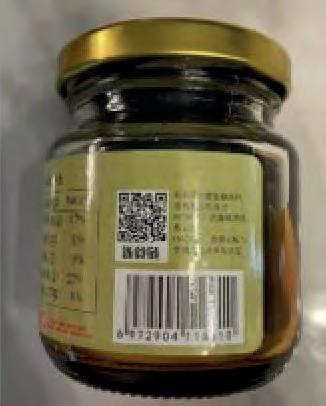









ProPak Asia 2025 is set to return as a pivotal event in the dynamic world of processing and packaging, a sector constantly evolving due to technological advancements, changing consumer behavior, and increasing emphasis on sustainability. As the premier exhibition for processing and packaging in Asia, this event is recognized as a must-attend for industry professionals who need to stay ahead of the curve, discover innovative solutions, and engage in meaningful discussions on industry trends.
Entering its 32nd edition, ProPak Asia has steadily grown in importance over the years. It is not just an exhibition; it serves as a key platform for networking, investment, and industry collaborations.
n 2025, the event will once again offer attendees the opportunity to explore cutting-edge developments in a wide range of sectors, including packaging and processing technology, pharmaceuticals, logistics, material handling, cold chain, and more. Attendees will be exposed to


the latest trends and innovations shaping the future of the industry, all under one roof.
Following the remarkable success of ProPak Asia 2024, which saw

over 68,000 visitors and more than 2,000 exhibitors from 42 countries, the upcoming event promises to build on this momentum.
Whether they are a startup, SME, or established enterprise, ProPak Asia 2025 will provide invaluable insights and business opportunities. The exhibition will feature eight industry-focused zones: ProcessingTechAsia, PackagingTechAsia, DrinkTechAsia, PharmaTechAsia, Lab&TestAsia, PackagingSolutionAsia, Coding,Marking&LabellingAsia, and Coldchain,Logistics,Warehousin g&FactoryAsia. Each zone is designed to cater to specific market needs, offering comprehensive solutions that address the entire supply chain, from processing and packaging to logistics and warehousing.
In addition to the exhibition, ProPak Asia 2025 will host a series of highly anticipated activities and seminars.
Building on the popularity of past events, highlights will include the Global Packaging Forum, executive talks on future industry trends and sustainability, the Future Food, and specialized zones like Design Box and Lab&Test Theatre. These sessions will offer participants the chance to engage with thought leaders and stay up to date on critical developments in the industry.
Sustainability will take center stage at ProPak Asia 2025, with a renewed focus on environmentally friendly practices. The event’s theme, “Carbon-Neutral Pathways to a Su-



stainable Processing and Packaging Ecosystem,” reflects the growing global demand for more sustainable business practices.
With increasing pressure from both customers and governments, businesses must adapt sooner rather than later to benefit in every dimension. ProPak Asia aims to provide a platform where companies can explore carbon-neutral solutions, paving the way toward a more sustainable future.
Set to take place from 11 to 14 June 2025, at BITEC in Bangkok, ProPak Asia 2025 will occupy Halls 98104, offering exhibitors and visitors a rich environment for exploring innovations and creating business opportunities.
As much more than just an exhibition, ProPak Asia continues to foster a thriving community where the industry can invest, grow, collaborate, and transform together.
For more information about the show, please visit www.propakasia.com
For further information, please contact buranarat.c@informa.com

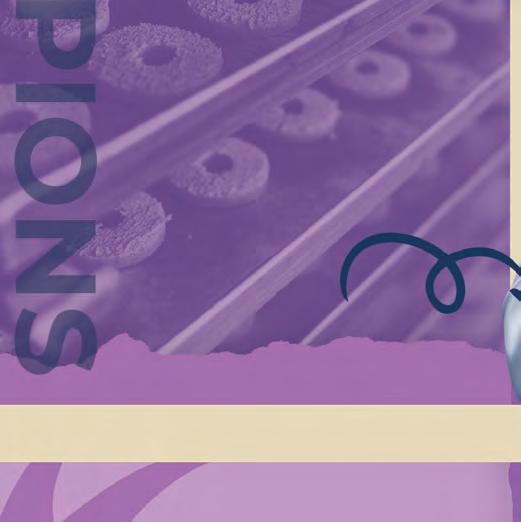






Delicious baked goods begin with baking professionals, like you — people who care about what they do and see change as a chance for growth. hat s who you ll nd at rafted by the industry for the industry, this event brings you together with a global community facing your same challenges like supply chain issues , as well as opportunities speci c to your role. From strategies for navigating unpredictable commodity prices to innovative automation solutions, everything you need is here, at your show.

PROSWEETS
02-05/02/2025
COLOGNE
Trade fair on technologies for the confectionery and snack industry.
FRUIT LOGISTICA
05-07/02/2025
BERLIN
Trade fair on technologies for the fruit and vegetable industry.
BEER&FOOD ATTRACTION
16-18/02/2025
RIMINI
Trade fair for the beer, food & beverage world.
23-25/02/2025
BOLOGNA
International exhibition of healthy eating out.
SLOW WINE FAIR
23-25/02/2025
BOLOGNA
International fair dedicated to the good, clean, and fair wine.
MECSPE
05-07/03/2025
BOLOGNA
International trade fair for the manufacturing industry.
PROWEIN
16-18/03/2025
DUSSELDORF
International trade fair for wine and spirits.
VINITALY
06-09/04/2025
VERONA
International exhibition for wine and spirits.
16-18/04/2025
SANTIAGO, CHILE
International trade fair on packaging and packing technologies.
TUTTOFOOD
05-08/05/2025
MILAN
B2B trade fair for the entire agri-food ecosystem.
MACFRUT
06-08/05/2025
RIMINI
Trade fair for the fruit and vegetable industry.
SPS/IPC/ DRIVES ITALIA
13-15/05/2025
PARMA
Fair on automation, components, and software for the industry.
IBA
18-22/05/2025
DÜSSELDORF
Trade fair for the bakery and pastry industry.
IPACK-IMA
27-30/05/2025
MILAN
Trade fair on technological solutions for food and non-food processing and packaging.
GULFOOD
17-21/02/2025
DUBAI
Fair on hospitality and food products.
07-10/04/2025
ALGIERS
Salon for companies of the agri-food sector.
19-22/05/2025
TEHRAN
Fair on packaging technologies.
PROPACK ASIA
11-14/06/2025
BANGKOK
International exhibition for packaging.
GULFOOD MANUFACTURING
04-06/11/2025
DUBAI
Fair for the packaging and food & beverage industries.
GULFHOST
2025
DUBAI
Hospitality fair for the Middle East, Africa, and Asia.
HOSPITALITY
QATAR
2025
DOHA
Fair on hospitality and HORECA.
24-27/06/2025
SAO PAULO, BRAZIL
Trade fair on packaging technologies.
15-19/09/2025
MUNICH
Trade fair for the beverage industry.
20-23/09/2025
STUTTGART
Trade fair for baking technologies.
23-25/09/2025
NUREMBERG
Trade fair on technology for powder product processing.
23-25/09/2025
NUREMBERG
Trade fair for the packaging industry.
08-09/10/2025
VERONA
Exhibition on energy efficiency and renewable sources.
08-09/10/2025
VERONA
Fair on automation and instrumentation.
17-21/10/2025
MILAN
Trade fair for the hospitality and HORECA sectors.
28-29/10/2025
PARMA Conference-exhibition on production lines a nd technologies for the food industry.
Salon for the laboratory and analysis sector.
07-13/05/2026
DUSSELDORF
Fair on production lines, solutions, and materials for packaging.
17-21/10/2026
PARIS
Trade fair on food products.
27-30/10/2026
PARMA Fair on technology for the food and beverage industry.
10-12/11/2026
NUREMBERG
Fair on technologies for beer and beverage production.
17-20/11/2026
MILAN
International exhibition on enology and bottling.
23-26/11/2026
PARIS
International exhibition for packaging.


AKOMAG SRL
30-31
Frazione Diolo, 15/D 43019 Soragna - PR Italy
CHIARAVALLI GROUP SPA
SOCIO UNICO
51/53
Via per Cedrate, 476
21044 Cavaria con Premezzo - VA Italy
COLOR SERVICE SRL
90/92
Via Divisione Julia, 15 36031 Dueville - VI Italy
DNA MARKETING
22/24
Avenue Landas 2 boite 3 1480 Tubize
Belgium
DUBAI WORLD
TRADE CENTRE - DWTC
75
P.O. Box 9292
Dubai
U.A.E - United Arab Emirates
EMILOS SRL
1-80-81
Via della Costituzione, 6 42025 Cavriago - RE Italy
FRUTTHERA GROWERS SOC.
COOP. AGR.
36/39
Via Provinciale, 15
75020 Scanzano Jonico - MT Italy
GENERAL SYSTEM
PACK SRL - GSP
73-61/65
Via Lago di Albano, 76 36015 Schio - VI - Italy
GORRERI SRL
76/79
Via Alfieri, 11
42041 Sorbolo Levante di Brescello RE - Italy
GRUPPO
FABBRI VIGNOLA SPA 8-9
Via Per Sassuolo, 1863 41058 Vignola - MO - Italy
HYDRO-MEC SPA
56-57
Via della Tecnica, 19 36049 Sovizzo - VI
Italy
IFP PACKAGING SRL
61/65-69
Via Lago di Albano, 76 36015 Schio - VI
Italy
ILAPAK INTERNATIONAL SA 29
P.O. Box 756
CH-6916
Grancia - Lugano Switzerland
INDUSTRIAL AUCTION BV 21
Looyenbeemd 11 5652 BH
Eindhoven
The Netherlands
INFORMA MARKETS THAILAND
105/107
428 Ari Hills Building, 18th Floor, Phahonyothin Road, Samsen Nai, Phayathai 10400 Bangkok thailand
LAWER SPA
3-82/83
Via Amendola, 12/14 13836 Cossato - BI Italy
LINBO S.C.A R.L.
49-50
S.P.103 C.da Furnoli Massafra 74016 Massafra - TA Italy
LUFTHANSA CARGO AG I COP
Tor 21, Gebäude 322 60546 Flughafen Frankfurt - Germany

MILKY LAB ITALY SRL
88-89
Via Raimondo Della Costa, 670/A 41122 Modena Italy
MINI MOTOR SPA
95-96
Via E. Fermi, 5 42011 Bagnolo in Piano - RE Italy
NAVATTA GROUP FOOD PROCESSING SRL 25/28
Via Sandro Pertini, 7 43013 Pilastro di Langhirano - PR Italy
OMIP SRL
5-16/18
Via Ponte, 21 84086 Roccapiemonte - SA Italy
ORION
ENGINEERING SRL
86-87
Via Pietro Gobetti, 6 43036 Fidenza - PR Italy
PELLACINI
ENGINEERING SRL 43-44
Via Calestano, 20 43035 Felino - PR Italy
PND SRL
II COP-34-35
Via Brancaccio, 11 84018 Scafati - SA Italy
PRO CARTON
72-74
Tödistr. 42
8002 Zurich Switzerland
PROXAUT SRL
97-98
Via Della Tecnica, 4 41013 Piumazzo - MO Italy
RAYTEC VISION SPA 84-85
Via F.lli Lumière 43122 Parma Italy
TARNOS S.A. 13/15
Calle Sierra de Gata, 23 28830 San Fernando de Henares Spain
TECNO PACK SPA 61/65
Via Lago Di Albano, 76 36015 Schio - VI Italy
UNIVERSAL PACK SRL 58/60
Via Vivare, 425 47842 San Giovanni in Marignano RN - Italy
VERINOX SRL 54-55
Via della Fricca, 37
38049 Altopiano della Vigolana TN - Italy


